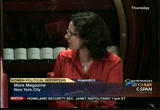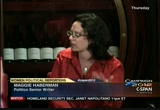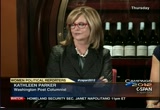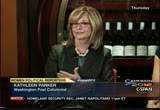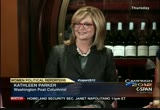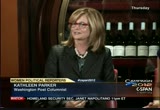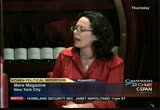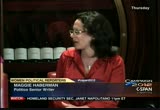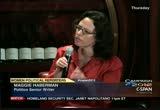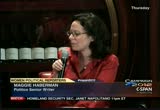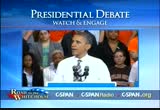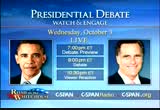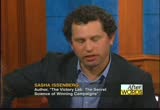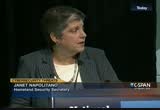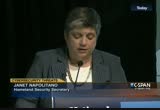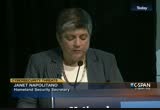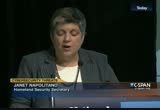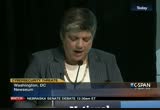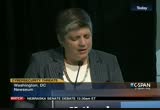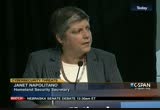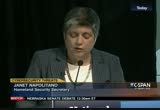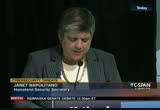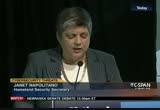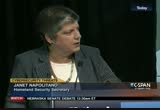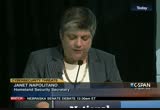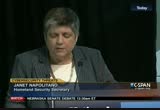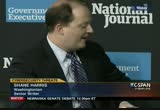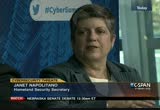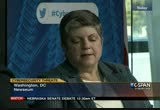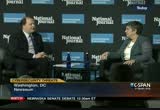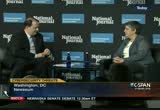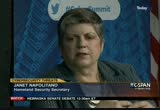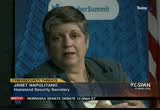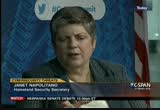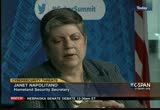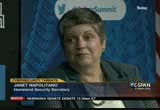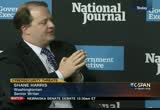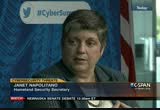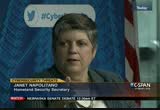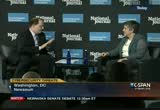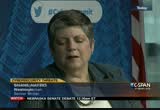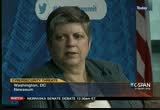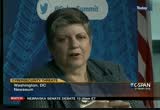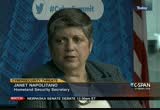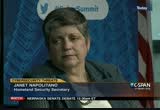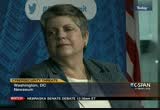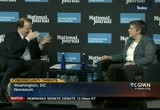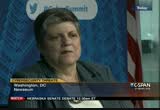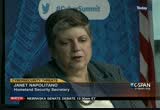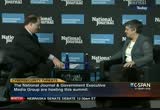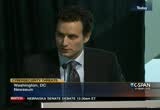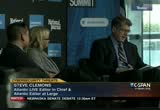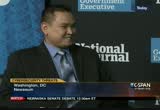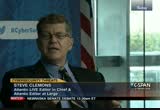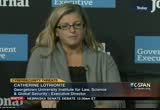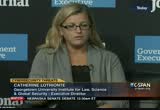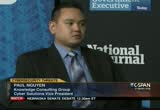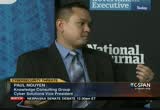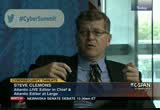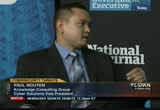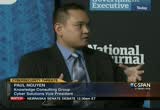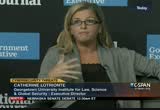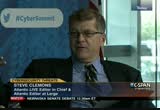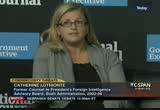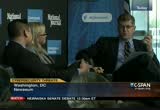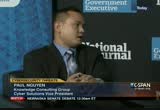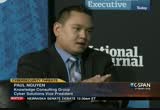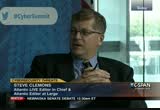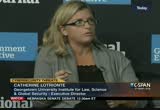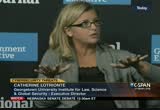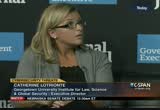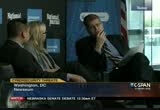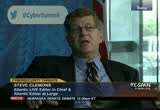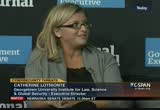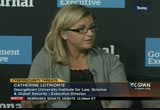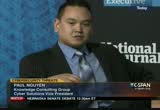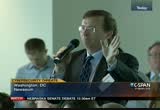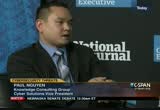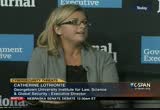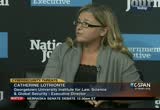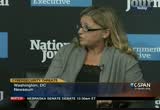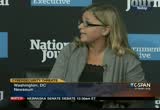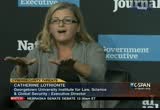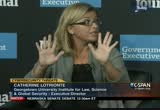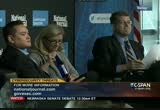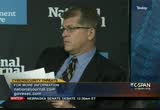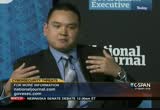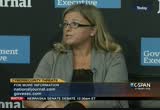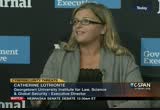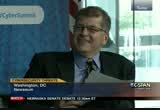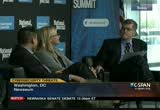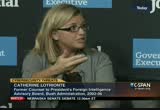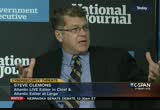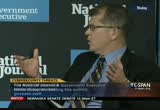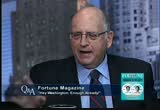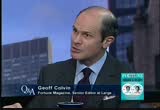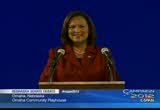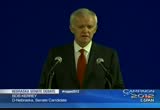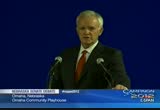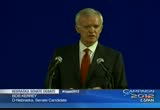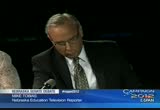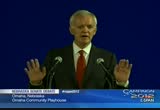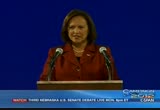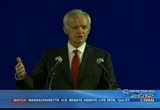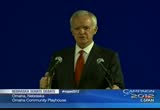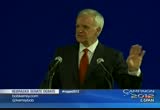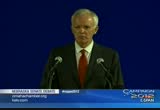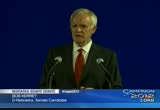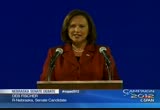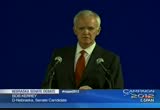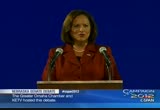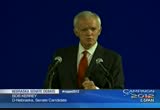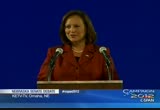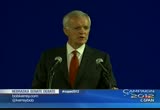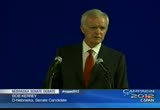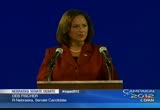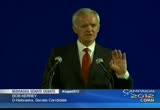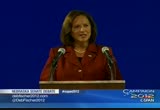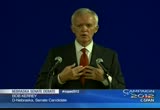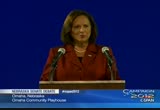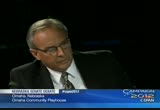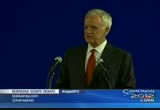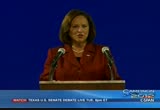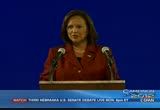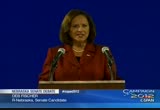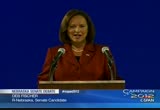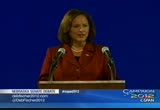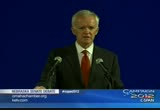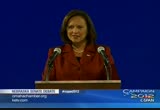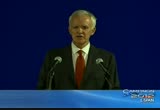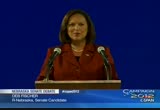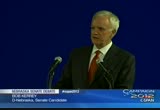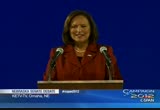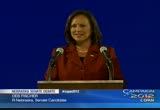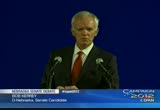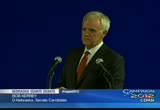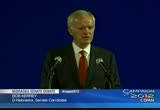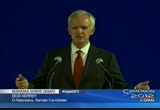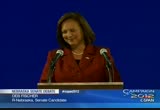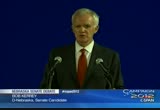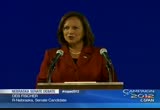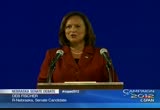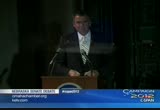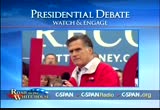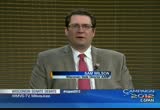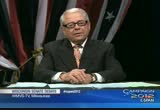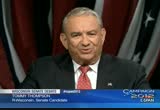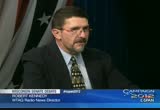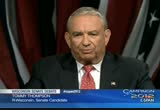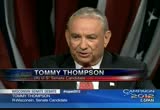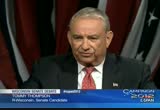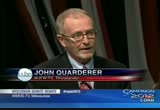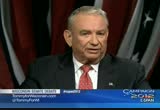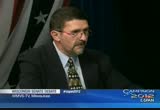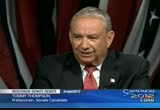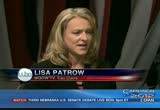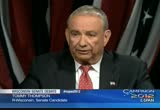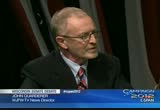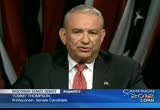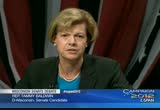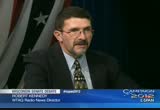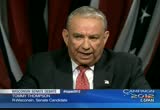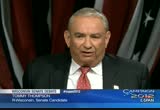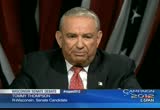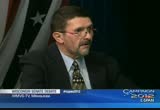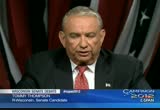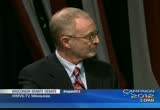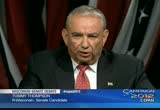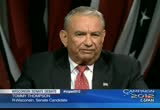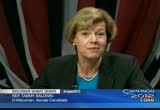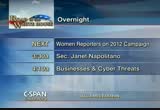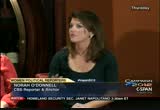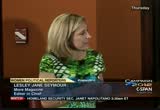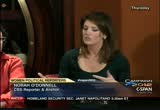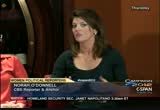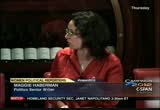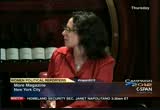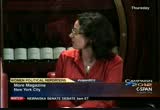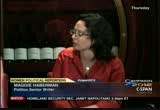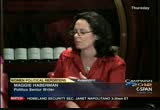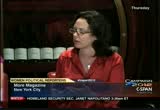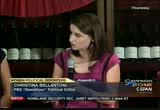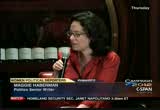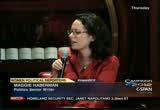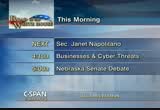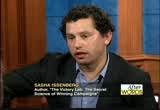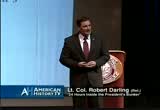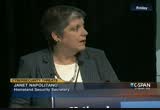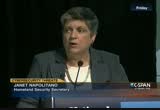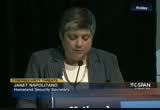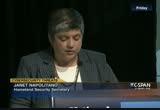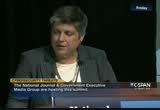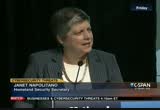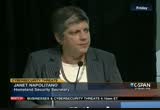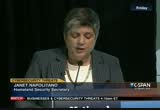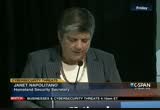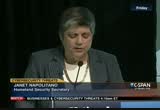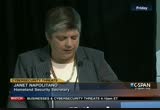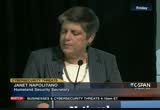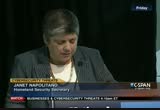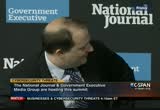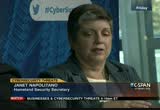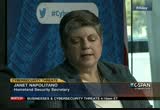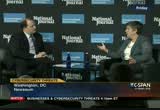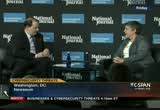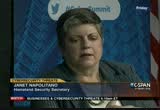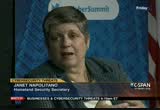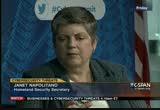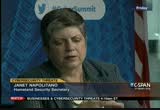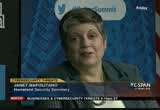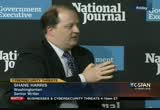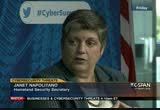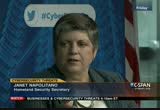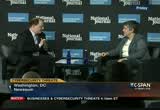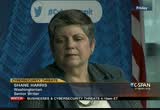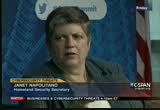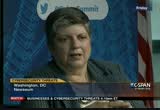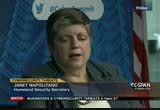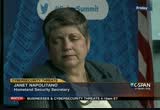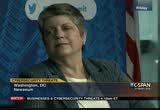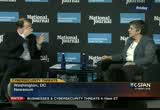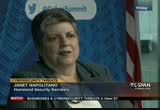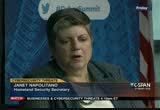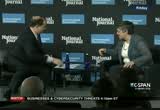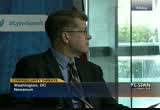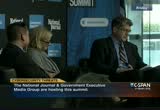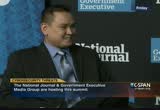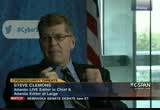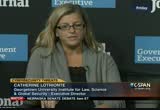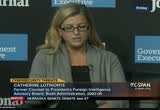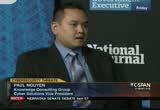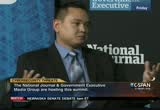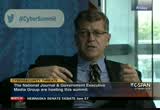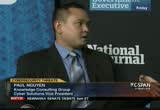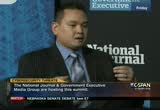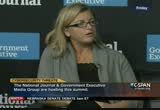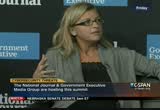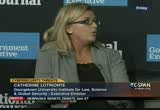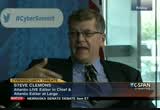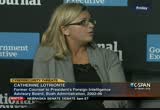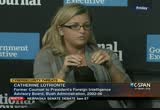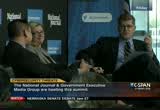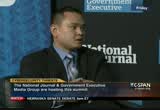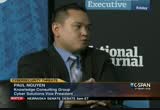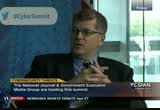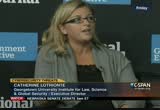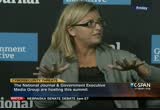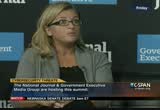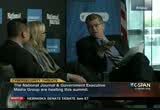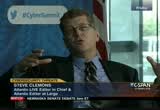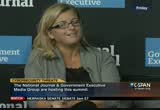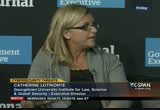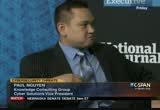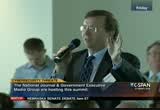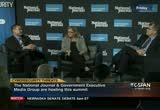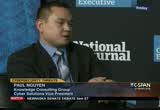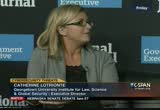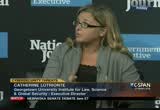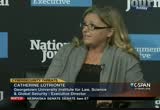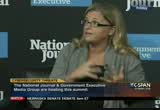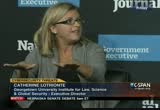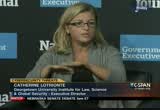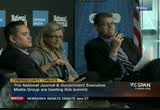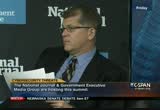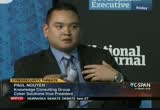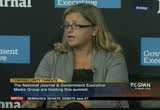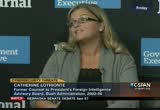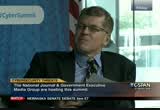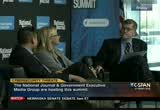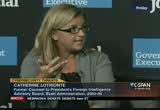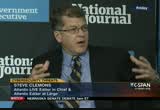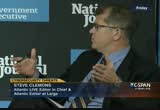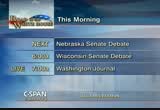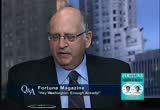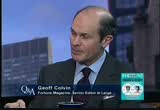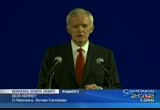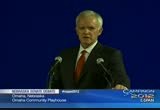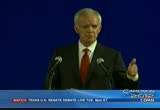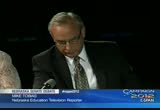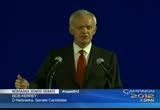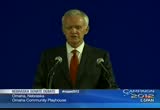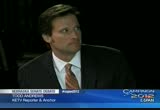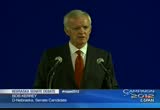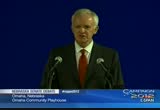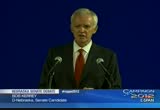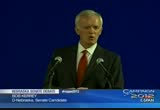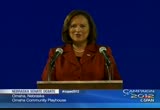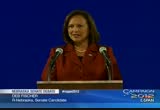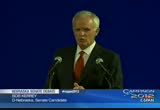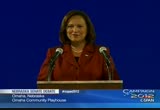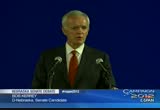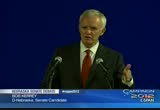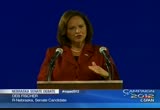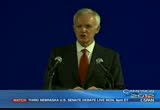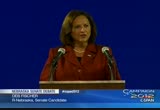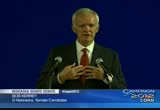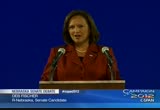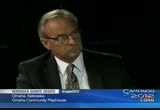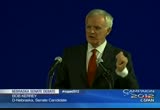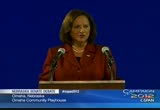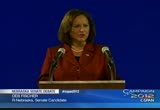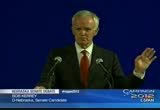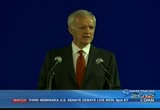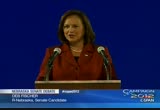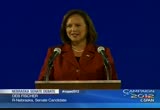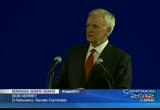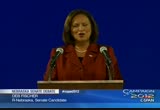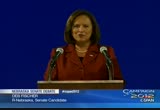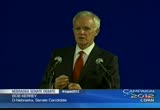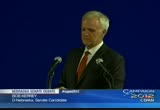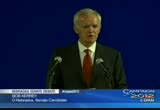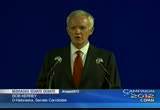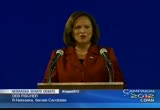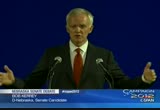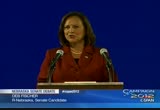tv Politics Public Policy Today CSPAN September 28, 2012 10:30pm-6:00am EDT
10:30 pm
a little harder to do dowel. >> if one did that, to tell people what your job was, having a casual conversation. it is fair game. >> is there anything that either of the candidates have done that surprised you in terms of their character going the opposite direction of what you thought? >> i don't think in terms of character, and out. -- character, no. what surprised me in terms of mitt romney is that there are a lot of a genuine interesting stories that you heard about the convention, the people he has helped.
10:31 pm
but there were a lot that did not get cold. the ones that were told were very serious and heartbreaking. there were a lot of stories about decency, him as a person. they are very interesting. there are decisions on an ongoing basis not to share them in a public way. >> several olympics ago, i was going to cover the event, and he happened to be there in their role of his head of the olympic games. i had never met him before, so we just had a conversation. when i said to him, more than four years ago, there is a lot of talk about your running for president and the person that answer that question was a completely different person than the person that talked about his sudden.
10:32 pm
-- his son. it is a very interesting dynamic and in a way, sometimes, i found politicians to be the opposite of that. there are politicians, so they are very out there when they are talking about something that is going to get them elected, but they don't want talk about themselves and their families and i felt as though he was kind of a different person and you can almost which many politicians, see the wheels turning. you could ask them a pretty simple question. it is not a trick question or a complicated question, but you see the wheels turning about how they will parse their answer. that is not only a lot different from what it was when i started decades ago, but it is also common to your point, has surprised me as well because the person that i heard about during the olympics was this guy
10:33 pm
that was this really nice, decent man. it seemed like they didn't want to share that until the convention. >> i was thinking as you were talking that a personal story about a politician i covered that surprised me, it was in 2001, mayor guiliani was divorcing his wife. he sent her a letter, telling her that she was fired as the first lady. i think this was after that. i got a tip about it, at an event for blumberg's that was running for mayor. he had no chance at that point at a summit at the event meant
10:34 pm
to me that she was getting this letter. i said, i will chase this tomorrow. the heat was pressing. we got the story pretty quickly. afterwards, i thought, what are really amazing thing to do. send a letter saying that you are fired, essentially. i don't feel like you hear those kind of story is emerging about governor romney. you don't hear the positive ones either, but there are times in corporate life, you don't hear lots of people coming out of the word work saying he was a terrible loss. >> i would agree with everything you have said. i think it could begin to change shortly. because that is the story that is left to tell. i have known the people that work for him.
10:35 pm
he is surrounded by a very loyal and find people. i judge people by the company the key. this stirling's a vote of people. -- sterling stable of people. he's private. to him, it feels like bragging to tell these stories and it draws attention to his religion which he is reluctant to spend a lot of time on. there were people talking now, trying to encourage these stories and getting people to talk openly about their experiences. what is surprising is not so much his view on issues, but the thing that made him an attractive national candidate was the fact that he was able to work across the auto and he was, in fact, a moderate.
10:36 pm
in order to get the nomination, he had to go so hard right in order to bring those people on board and unfortunately, it seems he is not able to do the poll lead at most of them do at this point. most people say you have to be angry, tough, but that is not his temperament. that comes across as false. what i find myself hoping for, for the sake of the country and a fair fight is that he can get back to being the person that he is without worrying what anybody is going to think of him. what difference does it make? just to be who you are? it is no longer about the republican primary. >> if you are not authentic, we put a girl on the cover or a woman that people perceived as not authentic to herself, it is just across the board right now.
10:37 pm
>> i will add the that katmai's -- my surprising thing was about vice-president biden. he will talk about anything for a long time because he likes to do that. and even as vice president, i am surprised at how open he is. when you do encounter him, he will still stop and talk and actually enter questions. it is refreshing because it is so rare. >> we all talk to people every day and when you hear an authentic cancer, you know that is not a talking point. i don't know what to do with that because you get used to them saying the same things over and over.
10:38 pm
our job is to get through it. >> what about the first lady? i will open up to the floor after this. are they exactly the way they come across on tv and in the press? >> i have so much admiration for all first ladies, without exception. because they are judged so harshly, they can do nothing right. i am a little upset with michele today because i have not been able to eat. >> does she do that at every lunch and class >> i am trying to be more nutritious, kids are boycotting because they say they want macaroni and cheese. i don't know mrs. obama well left and say if she is -- she was surprisingly kind of reserved and quiet and tumble.
10:39 pm
ito laura bush a good deal better. the which travel to the middle east -- we traveled to the middle east. at laura bush is exactly what you think she is. she is lightly guarded but she has a sense of humor. i am not sure that that is something that people know. humor is very tricky because it is found in a reverence and as a first lady, you have to watch yourself carefully. but she is very funny and i will tell you a quick anecdote. we were looking at family pictures, and there are almost no indicators that a former president of the united states lived in this house. it is not like here is president bush in his flight suit. there is one picture, the what
10:40 pm
of all the president's in the office. i said to her, and you miss the white house? gigots -- she goes -- are you kidding me? >> for me, having not just about first ladies, but they all have potential first ladies. the stories that always tend to stick with me had to be that it is much harder for the family. even if you are an experienced political family, it is hard. we all take things that happen to our families and i choose to be in this business. if somebody goes on my page and
10:41 pm
doesn't like an interview i did, that is part of my life since i started in journalism. some people like what you say and some people don't. but my family takes it very personally. it is hard for them to see that somebody said something critical of me. magnify that for being on the political stage and often, the best conversations i have had with potential first lady's are really to the heart of what they think about. the psychology of it. there is a protection instinct, and there is an instinct for people to know what they see, why they marry this man, and their children. that is an overriding concern for them and it makes them very relatable because it is something that we can all understand. i have often been very touched to hear their stories about how important it is for them.
10:42 pm
i want people to know this. but i also want to guard him from that, or my children from that. i have found that to be something that i think a lot of people need to think more about, and away, in this universe where everything goes so fast. think before you hit send. >> don't drink and send. >> we have learned big news today. >> the question, who would want to be president? it is a difficult job. of course, how do you go about bringing that into your life? my experience with the first lady has been minimal, but i covered others full time in 2007, especially at iowa. seeing the way that john edwards interacted, there were problems between the two of them
10:43 pm
and it was very revealing about his personality. it tells a lot about this person. >> i don't have much more data on those experiences. [indiscernible] i think ann romney was quoted the other day about the criticism that her husband is getting. i got a lot of the males -- emails on our blog varying from good for her to "doesn't she get it?" or "imagine if michelle obama said that." it was probably not something
10:44 pm
that the campaign wanted as a structure of a statement. she was talking about her husband and talking about seeing her husband. the responses that you chose to run for office. what we demand of our candidates is a lot. even for the criticism that he is getting about not doing enough in terms of events, he is doing a tremendous number of fund-raising, having a discussion about whether we should do other things. it is incredibly hard and incredibly grueling. it is impressive that they don't make more mistakes and off-cue moments. myan't imagine watching husband go through that.
10:45 pm
my husband being very protective of me when they are critical. >> my family loves reading by criticism. why do you get so upset about it? i think that they are thinking it. i will say that ann romney is feisty. i love what she did because it is so he a man at the helm tamp they don't her down too much. -- because she is so human, i hope they don't tamp her down too much.
10:46 pm
she is looking right at you, our eyes are not batting around. she is focused. i said, you seem unflappable. she said, i'm less flappable that last time around. i am tough. her husband has to be so controlled at all times, she sees herself as someone that can speak up for him. i love it. >> anybody have a question? >> [inaudible] i was wondering about fact checking in truth telling, in the same way they had viral moments where they pushed back. i have seen you do it, too. what about your vote on this?
10:47 pm
q. you think it has been a constructive conversation? and does it encourage you to push back when you are dealing with the campaign? >> i think it has always been our job. i have worked in columbus ohio at albany, new york. they are very political cities with a high-profile governors. to some extent, you have to put that out of your mind now because it used to be that if you had a tough or uncomfortable moment with somebody, that was said. now, it is out there forever. i think it is more important than ever when we have all lot of -- a lot of news sources, they believe what we do is so important.
10:48 pm
very consequential decisions, they will think about what they do when they go into the voting booth. i have been very curious to hear what the others say, on television all the time. the standards are different. they are different for men and women and how tough you can be pushing back. it depends on who the subject is, but some people don't like to get pushed back by a woman. >> can you give an example? i have had that with magazines where we do a story on somebody and we do a fairly reported story.
10:49 pm
somebody was angry about a cover line i used that was meant to balance out -- what i heard was that i am really sorry, it went too far. and we went to a woman's magazine. you deserve that cover line. i was so angry that he thought because we were a woman's magazine, it was a puffy peace and we would not talk about the other side. the buddy, you came to the wrong place. because women are reading it, you think it is john. -- junk. >> i was 21 years old when i got my first job in newspapers and radio before i was ever in television. the very early on, i was covering a murder case. it had nothing to do with
10:50 pm
politics, but i went to the scene, i found out something, and ran back to the tv station, and called the district attorney that had gotten involved because it was a very high-profile case and i said, this is what i just heard. he said if you report that, you will be wrong. he said i can't tell you, but you will be wrong. i wasn't wrong. it came out the next day through a male reporter. one of my bosses saw him and said, we're pretty furious. she is a girl, she will get over it. nobody would say that publicly now, that was probably 1980. but i learned very early that you can't be an idea about how people view you as a woman.
10:51 pm
i probably looked well, i was a young reporter at a very earnest. there are other factors, and you get a reputation. and you would not pull out on kathleen parker, i don't think. >> it was instructive for me at a young age had helped me to deal with things differently going forward. >> bringing back some very not fond memories. i hate to even tell you all this because you will know that i am so old. 1980, i covered the first republican primary in south carolina. i was a baby reporter and i did look 12. i got this. i was in the hotel room with ronald and nancy reagan, shouldn't you be doing your homework?
10:52 pm
i have the voice then that i have now, more or less, and i learned to play back. i would invariably show up without a pad and somebody would have to find me a pen. i can take my little boats and as my little questions. but now that does not happen. i don't have any sense that i am treated differently because i am a woman at this stage. >> it does happen. i have covered members of congress on capitol hill that think it is ok for them to put their arm around you while you are asking a question. there is a certain way that they treat you when you are young bird. -- younger. one thing that is interesting with the news hour, we do these interviews and they are among the best of the business.
10:53 pm
it is important to go back to your question, you don't have to print something that is not true at understanding that, having that confidence in yourself that someone gave me a complete line and i don't have to throw it in there because you need balance. you can do the truth finding yourself. it is very important to keep that in mind. >> i think they are two different questions. and what is the interviews and what is the fact checking phenomenon. in all three cases, i think that you are really good interviewer is that they handled themselves appropriately. it is not like what i am on the phone with someone. the fact checking industry is a different thing, it is more subjective. do i say this is pants on fire, partly true, mostly true?
10:54 pm
i think it is very important and the fact checkers have done a lot of really good work. in terms of the issue of women being treated differently, it is one of those things that they ballet. -- one of those things. i don't know the experience of being a male reporter, but there is a difference. my parents back at the new york post and my mother was a copycat. -- copy kid. she used to tell me stories about how every copy kid would be called "boy." it wasn't like that when i started in 96, but it is different. little girl, it is nice to see you out here at a murder scene. there is a difference.
10:55 pm
i don't think it's as bad as it used to be. maybe it is that i have gotten older and i am not aware of that or people treat you differently as both a woman and younger than just as a woman. but it is there and something to be conscious of and something for everybody to be conscious of. anytime there is a woman- related anything on the campaign, how it is like, it is in my and box. how about back? >> i have more experience in this gender issues in the television world that i have in the outside world. i just forgot what i was going to say. dodge what did you say last? >> i would get the female things.
10:56 pm
>> i would get calls to be a talking head. this one network, it was always something about sex. the football coach recruiting football players, would you come and talk about that? what are you going to say except that is awful. there was a trend. i'm not a happy talking head unless i just wrote about it. if it's always a sex issue, i'm not your go-to girl. that is difficult. >> i think it is really important. i always tell young women to ask a question and don't be afraid. it was my philosophy that people did look at me than -- as younger and not having much experience.
10:57 pm
i forced myself to ask a question every time i went anywhere even if it was not a great question. >> you are brave, that is hard to do. anybody else? a silent crowd. we have got to go eat. i want to thank you for being here and thank you for coming. let me give a shout out to blair that is back there. polling this thing with one hand and my staff that helped. thank you for coming. >> having spoken to everyone that is here, i speak for us all that because of the job that we do, it is such a treat. you guys are so wonderful and it was a pleasure to deal with you.
10:58 pm
lesl youtubeie -- thank you to leslie, blair, patric. >> johnny is here. if you want styling and vice, go sit with him. -- advice, go sit with him. [captioning performed by national captioning institute] [captions copyright national cable satellite corp. 2012] >> c. the first of the presidential debates next wednesday, live on c-span, c- span radio, and c-span.org. watch and engage. next, jan at the paula todd now wants ivar security followed by a discussion on -- janet napolitano on cyber security followed by a discussion on business and cyber threats. >> my opponent and his running mate are big believers in top-
10:59 pm
down economics. they think if we spend another $5 trillion on tax cuts that favor the very wealthiest -- >> [booing] >> don't boo. vote. vote. >> one new idea. there is one thing he did not do in his first four years, raising taxes. is there anybody that thinks raising taxes will help the economy? his plan is to continue what he has done before. the status quo has not worked. we can't afford four more years of barack obama. >> president obama and governor romney meet in their first-ever presidential debate. watch and engage including the live debate preview at 7:00 p.m. eastern with the debate at 9:00
11:00 pm
had posted the day. -- and post-debate. >> i was always shot as anybody that spent a lot of time around campaigns, most people could not explain to me why they did anything they were doing. at some point, they did it because they have always done it that way or there was some sort of role that wasn't really based in any research. i went around the campaigns with skepticism about some of the practices that were taking place. as i learned about people that were doing these field experiments and randomized controlled trials, learning more about the information and targeting based on
11:01 pm
revolutionizing campaigns in the past decade, this was a major generational shift. in addition to all of these campaigns changing the way they operated, there is cultural tension between the old practices and the new empirical. >> saturday night at 10:00 eastern. he dodged congress must act now to address ever security protection. the obama administration is drafting an executive order to address threats against the cyber infrastructure. it still needs to be done. the comments are about 35 minutes.
11:02 pm
>> thank you and good morning. happy friday to everybody. i want to thank national journal and government executive for inviting me to this year's a cyber security summit because i can think of no more urgent topic in today's interconnected world. the cyber domain is woven into the fabric of our daily lives. while this increased productivity has led to significant transformations and advances across our country and around the world, it has increased the importance. the flip side of all the good that comes from the internet is that cyber attacks have increased over the next decade.
11:03 pm
here is a quick sense of scale. last year, u.s. computer emergency readiness team that surprise -- provides response for the federal civilian part of of the partners, last year, the u.s. responded to more than 106,000 incident reports and released more than 5000 actionable cyber security alerts. specialized teams for vulnerable and industrial systems. the words cyber security encompasses a broad range of malicious activity from the nile of service attacks to the theft of intellectual property to intrusions' against the government that works.
11:04 pm
last year, a water plant for a small town in texas is connected its control system from the engine that after a hacker posted pictures of the facilities internal controls. more recently, attackers penetrated the network of companies critical sectors of the economy including the nuclear and chemical industries are increasingly targeted. we faced a range of traditional crimes perpetrated through separate networks. these include child pornography as well as banking and financial fraud, which pose a severe economic and human consequences. a study last year calculated the cost of cyber crime at $114 billion annually globally, and that is a very conservative estimate. when combined with the value of
11:05 pm
time victims lost, this figure grows. how do we address these threats proved how do we address them across a distributed network that is controlled by the private sector and touches every single one of us from large companies to state and local governments? we begin by fostering a culture of shared responsibility, and gauging all levels of society and working to make sure as cyber space is as secure as possible. dhs has important responsibilities in this regard. we are responsible for securing government networks to secure their networks through risk assessment, mitigation, and
11:06 pm
capability. to protect civil agency networks, we deploy innovative technology to detect and respond to intrusions, and developing e effective mechanisms to reduce the negative impacts of potential attacks. we are responsible for leading the national response creating and maintaining a common operational picture for cyberspace across the government. we act like a cyber fema, whereby resources are coordinated and deployed with dhs serving as the hub. to combat cybercrime, we leverage the skills and resources of the secret service, immigration and customs enforcement, coast guard, and porter protections, and we worked with doj and the fbi to investigate and prosecute criminals.
11:07 pm
we serve as a focal point for the government's out reach an awareness efforts. it is important note that private industry owns and operates the vast majority of the country's critical infrastructure networks. the private sector plays a critical role in protecting the nation's cybersecurity. dhs has initiated programs to promote that collaboration. we have spearheaded the development of the first-ever national cyber incident response plan to enable us to coordinate responses to incidents at all levels just like we do for incidents in the physical world. the private sector is also an active participant in the national cybersecurity communications and integration center. it is a watch setter that coordinates activities across
11:08 pm
the government and with private sector partners, providing watch and warning, analysis, and response. dhs is leading efforts to protect critical information infrastructure by sharing information, helping stakeholders identify former abilities before an incident occurs and providing for its assistance to aid response and recovery after we learned of a cyber attacks. our industrial control systems, computer emergency response systems, conducted 78 assessment of controlled system entities, which helped both companies secure and identified gaps in their systems and prioritize their mitigation activities. we made available to separate self-evaluation tool which was utilized by over 1000 companies in the last year.
11:09 pm
continued innovation is critical to keeping cyber networks and systems safe. we have a strong science and technology directorate that has worked cooperatively to develop tests and transition deployable cyber solutions and technology. among its many projects, it is leading efforts to develop more secure internet protocol to protect consumers and industry. because each member of the public plays an important role in cyber security, which sponsored a campaign which is a year-round effort designed to engage and challenged americans to join the effort to practice and promote safe on-line practices. we want good cyber habits to be as ingrained and as familiar as putting on your seat belt. if you are not already a friend
11:10 pm
of the campaign, i encourage you to join today. in a few days, we will kick off national cyber security awareness month which is an opportunity each october to emphasize the culture of shared responsibility necessary to maintain a safe, secure, and resilient cyber environment. we must work internationally because the cyber criminals do not respect traditional national boundaries. attacks can and do to emanate from any place around the world. last may the united states released a new international strategy for cyberspace to help provide a blueprint for building an international framework to make sure cyberspace more secure and reliable. much remains to be done in this area, as the need for sustained international engagement becomes more apparent every day.
11:11 pm
as much as we have done, there's still a lot of work to do, because of threats to cybersecurity are real, serious, and the eve of rapidly. together we can and we must maintain a cyberspace that is safe and resilience that remains a source of tremendous opportunity and growth for years to come. to that end, we need to work more effectively with the private sector to tackle the difficult challenges -- first, real time information sharing between the public and private sectors, and second, whiter adoption of cybersecurity best practices for the nation's critical infrastructure. in cyberspace, seconds matter, and when information is not shared, it makes it infinitely more difficult to prevent attacks and to minimize any
11:12 pm
damage that might occur. we need to ensure that the government can use information at various levels of classification to help the private sector protect itself. we need greater information sharing so government can learn from the private sector, where people fight this threat every day. businesses, state or local governments, are the first to identify new malware. sharing that information with dhs enables us to prepare others and provide assistance as requested. the majority of intrusions use former abilities that are widely known. information was there and there was no action. that is why we also need standards for companies upon which our national-security depends. as part of this effort we encourage private-sector capacity building, including investment in strong as ever defense protections and work- force training. for tickets, industry and
11:13 pm
government have worked together to protect the physical security of critical assets that reside in private hands. airports and seaports to national broadcast systems and nuclear power plants. there is no reason why we cannot work together in the same way to protect the cyber 62 systems of our core critical infrastructure upon which so much of our economic well-being, national security, and the lives depend. in the current landscape, we execute cybersecurity missions under an amalgam of existing statutory and executive authorities that need to be updated, clarified, and streamlined. the plain fact is we must address cyber security now, not years from now, and dhs is committed to working with all affected parties to move forward quickly on this issue. in the meantime we are moving
11:14 pm
forward on building our own world-class cybersecurity team and a strong dependable work force pipeline for the future. where making investments in the cyber workforce to growing our national division by more than 600% over the last four years, and the president has requested a 74% increase from congress to did dhs budget in 2013. we're building stronger cybersecurity career paths, from scholarships, fellowships, internship programs, creating more opportunities and extending the scope of cyber education beyond the federal work place while working to attract top professionals to work with us in the scientific and cyber fields. we also began a new effort to our homeland security council in conjunction with public and private sector partners to develop an agile cyber or force across the federal government. i am looking forward to the recommendations. in conclusion, all of us depend on a safe, reliable separate
11:15 pm
network in our daily lives and businesses. all of us must do our part to help protect these networks. that is true whether you are a security professional in government, a member of the media, or an internet user. we share the advantages of our internet age, but with that comes responsibility. i thank you all for being here this morning to discuss this topic, and i think again the national journal and government executives for hosting today's gathering. let's get to the questions. thank you. [applause] >> thank you. interviewing the secretary is shane harris, and prior to joining -- >> i want to pick up where you were leading off and take it to
11:16 pm
where things stand right now. the administration has been trying to pass a cybersecurity bill. you have said the administration is preparing to release an executive order that will allow the government to do many things that you want to do in the bill but will not be able to do legislatively. >> there is an executive order that is being drafted in the interim agency process. i cannot give you a firm time line, but it will help in terms of clarifying the authorities and the like. it cannot do things that legislation can only do, such as liability protection for companies when they are sharing information, such as giving dhs relief from the normal civil service and salary requirements we can pay so we can compete in
11:17 pm
the workplace. there are other things as well. the executive order help, but we still need comprehensive cyber legislation. that is something that the congress is going to have to come back and address perrier >> you have talked about and said in testimony on the hill recently that there has already been a deep dive going into various sectors, places where it is presumed government could use its existing authority to set standards, demanding things. what with the order potentially say, and since you have been doing this, where are they? >> again, the executive order is in draft, and the president has not had the opportunity to
11:18 pm
review it, so i need to be cautious. he has been occupied. i think we are caught the set that in some industries there exists already regulatory authorities that can be used for cybersecurity. we do not want to be redundant. we want to make sure that the court critical if fisher of the country protect us, and one of the problems in that regard is cybersecurity is a shared could. it is not something that you would not necessarily put on the bottom line as your return on investment. encouraging the kind of investment necessary is difficult, and when security is concerned, we have to approach it as to what does the nation need? >> to look at this critical and
11:19 pm
researchers you are talking about, let's name some of them. what is the most vulnerable? >> all of them. i will not rank them, but -- let's take the energy sector. it is an example where you already have ferc, and it has its regulatory authorities, some of which already touched on cyber. when we do a deep dive, we are looking at what is already happening in that project interceptor. >> and you look at it is any good? >> yes, to make sure the sector it is as secure as possible. >> is it going to be a new executive order or an expansion on existing directives? >> i do not want to go into detail here, but i would say
11:20 pm
that it is in the format of a new order. >> you are still hopeful about legislation? >> we have to. the executive can only do so much. the decision does me to the address. one of the benefits of the debate in congress this past spring and summer was there was a lack of basic cyber awareness in the congress, and what this means and what the security for our abilities of the country really are, i testified several times and said we deal with threats emanating from all over the world, all types, but the two we see most often are aviation and cyber.
11:21 pm
cyber has been on a growth curve like this. congress is now more aware than they were before. >> anybody unaware of the immediacy of the threat? >> absolutely, and we did some demonstration to members in day capitol. >> to scare them? >> hopefully, yes, and i regret the debate devolved into the typical regulation or this is not regulation. this is a security issue. >> we're talking about the government telling private companies how to run their properties. >> no. we're talking about a viable partnership between the public and private sectors, where there is information sharing and where there is the employment of best practices and best technologies available. i do not view this as the government telling you what to do. far from it.
11:22 pm
what we are saying is if you are the owner and operator of course critical infrastructure and which other businesses depend, and communities depend, we need to make sure that your cyber networks are as secure as possible, and that should you be protecting a sign of now where, there is real time information sharing so we can we get to the threat. >> don't people know that now? these companies surely know that they are under attack. they know you are very concerned about it. how much corporation can you expect from them if this is voluntary? possible it's highly -- and we do it the other ways in terms of critical
11:23 pm
infrastructure -- so do you engage in that thing had a partnership and reached out, and we say they are aware, and they say they are aware, but when it comes down to where do you investing your company, where do you park your resources, that decision is not one that would normally take into account the cybersecurity for the country beyond a particular element. yet we are all interconnected, and that is why there is a need for public and private partnerships. >> can each take some of those energy company c e zero's and give them the education you gay members of congress? >> ceo's and board members and the like -- i am describing the reality. the reality is that much in the nation's efforts -- we have vulnerabilities, and we do not
11:24 pm
have the ability of the need to have real time information so we know about an attack quickly. >> people see this in their own lives, too. do you practice two-layer dedication in your e-mail? we do not always integrate it into our lives. >> decade ago nobody put a seat belt on when they got in the car. cars did not even come with seat belts. we need that same kind of awareness and change more quickly where cyber safety is concerned. >> do you have amazon and itunes accounts separated? >> i do not use email at all. i cannot have any of my own
11:25 pm
accounts. i am very secure. >> you are off the grid. [laughter] >> some would call me a luddite. >> let me talk about your department's role about other agencies that have a stake in this. you are looking at the civilian domain looking at the intelligence community, but there is a partnership. i often hear people say the nsa will provide technical expertise and assistance to dhs. what does that mean? they say security is going to be a bunch of nsa guys and you will be the face of it, but the
11:26 pm
cuts behind the operation will be coming out of the military. >> we work with nsa, have people located at nsa, and with the fbi. you have a three-legged stool. you have nsa which is responsible for intelligence. you have got the fbi which is often the lead when there is a criminal investigation going on. you have dhs has the responsibility for system protection. between myself and the director of the fbi, the head of the nsa, the three of us have been personally engaged in making sure we have people co-located near clarifying our relations as with each other because that is the way we maximize resources each of us brings to the table.
11:27 pm
no, did not plan to have the nsa parked in everybody's homes. >> is that where the technical expertise presides in terms of they got the white-hat hackers? >> it is a unique resource that the united states has. there is expertise in other elements of the government, and then you get into a particular sectors, the department of energy which has the national labs, which are resources. in terms of one place where there is considerable cyber expertise, probably the best in
11:28 pm
the world, you would look first to the nsa. >> how often are you looking and speaking with the director of the bureau's? is this an ongoing process? >> it is ongoing, but the three of us get together because we're building. this is a new way to look at this noon and devolving threat to national security. we have to get out of thinking analog and think digital. we have to move and think of government institutions and how best they organize themselves. >> we will take questions from the audience. from the domain of cyber warfare, i was reading there was a senior official who runs the information assurance directorate, he said we are
11:29 pm
starting to see a nation state resources employed in cyber can ways we would describe as destructive. she was alluding to other nations engage in to online behavior that, this room, you would call something more than saber rattling, but something short of an offensive capability. i want to know, who are these countries we're talking about, what can dhs do about, and what is the inevitability? it is well known that we are on the leading edge of that, and shouldn't we be expecting other countries to want this capability and the messing with us as we have been messing with others? >> i think this goes to a point
11:30 pm
i made in my remarks, and that is the inherently international aspect of this. the traditional kind of law of war, nation state analysis does not work here in many respects. i think it is time for that nations of the world to have an opportunity to come together and look at a global convention or something of that sort that deals with the need to have a safe cyber environment for everyone's mutual benefit. it is not just about the united states. it is about the countries of the world. >> and that could look like >> the could look like a treaty?
11:31 pm
>> it could look like any kind of framework. >> steve put yourself in the camp of people in very senior physicians who look at cyber weapons as strategic weapons? you start drawing these analogies to the cold war, the nuclear arms race. the see if the playbacks -- see it that way? >> there is a lot of hot talk. >> it is washington, d.c. >> of questions i want to ask the go back to the executive order. where does the president authority begin and end, regarding a cyber executive order? can he issue the lieberman bill, as an executive order? and you have answered the second part of the harder. the president of authority -- is that something you are looking
11:32 pm
at? do you have the answers to that? >> i would start with article 2 of the constitution of the united states, the powers that derive from that. there are a number of supreme court cases. you begin with the responsibility of the president to keep the nation secure. >> if people are doing this by fiat, you are going to be accused of circumventing the legislative process, issuing orders. you are drawing analysis which the analogies to executive or your reporters. >> congress has had an opportunity to act. that is the preference. any executive order cannot do all the legislation can do. we are still going to need congress to come back and to act. in the meantime, there are things the president can do
11:33 pm
under his existing authorities that are under consideration. >> it should be noted there are members of congress urging you to do this. >> they are on both sides. i think senator who lieberman has advocated that it be done but because of the frustrations in getting the senate to act. >> you think you can come back in the next session and revisit it? >> yes. >> can you talk about what dhs is doing about denial of service attacks on u.s. banks, and your role in securing the financial sector? >> i think the financial sector it is what we would consider core critical infrastructure. we have worked with them in a number of ways to share information, and to help mitigate any damaged that is occurring, if we are requested to do so. we do have representatives of
11:34 pm
the financial sector. >> they are there, sharing information back with their industries, providing a conduit to you? >> what is right. dhs, for physical threats, he and it was started, the department was started, divided the national economy into a theme sectors. each sector has a coordinating council representative of the private industry in that sector, the works directly with dhs. fiscal infrastructure, safety and security. we are using the same model for how we do cyber. >> server security continues to capture more and more resources from the government, sometimes referred to as a black hole. how much spending on cyber security is enough, and how do we stop the need to grow without assuming greater risk? >> there is money in this.
11:35 pm
it has captured the imagination in the way i have not seen since maybe the war on terror. how'd you know when you have enough? how you measure that? whether it is resources or new systems you are going to be putting in place, how do you know when you sort of hit the optimal level? >> that is hard to say, in part because you are not dealing with fixed points. you begin here and end there. the there is always moving. we have to be agile, flexible. we have to have the work force necessary to carry out our responsibilities. how that equates into government versus private sector spending, i think, is impossible to insert a this point. >> we talked about the need for real-time monitoring capability. we can all get a sense of what
11:36 pm
that would look like. how close are you to having that? what of the impediments between now and your perfect system, to be agile enough to do the job as you are describing index >> i think 0 in neat -- i think one of the impediments is information-sharing, from the private to the public sectors. it is episodic. sometimes we get it. sometimes we do not. there are industry concerns about opening themselves to liability if they share certain types of information. there is, i think, they fear that if you acknowledge that you have been the subject of the attack, your competitors will use that against you. the information sharing we have now is not as robust as it really needs to be. >> who are the best of sharing, and who are the worst? >> let us just say where is room
11:37 pm
for improvement across all sectors. >> we only have time for a couple more questions. i interviewed you four years ago, when you had just been confirmed. you said you knew this was going to be a very big job, but the sheer enormity of it exceeded even your expectations, which were pretty high. this is a piece of what you do. you only have to secure the airports, the borders, immigration security, and the rest of it. what have you learned, looking back? what can you appreciate since i asked you the first convex >> this is the third largest department of the federal government. we have a huge international presence. we are in 75 countries, as well as the united states. whee how a huge response for
11:38 pm
disasters, sea borders, immigration enforcement. you name it, we have got it. i think, in this position, you really see how government needs to work to maximize our ability to protect people, without invading civil liberties. we are always working on the right balance there as well. it is a big job. >> will you stay in the administration if the president is reelected? >> i do not answer questions like that. >> if you were not homeland security, law and job would you want? attorney general? a commissioner of baseball? what is your dream? >> i think i want to focus on this job. this job, every day is an inventor. a lot of elements to it. >> madam secretary, thank you
11:39 pm
very much. >> thank you. >> at that same effect, a panel focused on the impact of cyber attacks on the private-sector, and how companies are dealing with it. this is about 50 minutes. joining us. -- >> thank you, everybody, for joining us. we will get started with the remainder of our program. now that we adequately frightened you this morning of all of the risks that are available to the hackers, we're now going to talk about cyber innovation. this is getting increased level of support and focused with efforts like cyber security awareness month and various wards going on. today we're going to have two individuals who are going to be interviewed by atlanta media's steve clemons. washington editor at large of the atlantic and editor of chief of atlantic live. he's also the former director of
11:40 pm
the new america foundation and cyber security expert to set him up for failure -- just joking about cyber security. he's going to be interviewing the vice president of cyber zhrutions for the securities for the consulting group and director for georgetown institute for law, science and global security. i apologized if i butchered the names. we will correct that in the feed. steve, i turn it over to you. >> thank you very much. it's great to be with all of you this morning. i want to issue an apology if you have twitter follow of mine, i have about 11,000 and yesterday they all got a note telling them i had just seen them in a fantastic video and they just clicked here, they could see it. and i think their 11,000 friends are cycling through. this is the first time, it's ironic that i have ever fallen for one of the sort of cyber gags -- i don't know what information they got from me, but nonetheless, i wanted to kind of mention it and out myself as someone who has fallen prey to nefarious folks in cyber land.
11:41 pm
we have with us executive director of georgetown institute for law, science and global security. she also directs the georgetown cyber security project and she also interestingly in the past worked with someone i'm well acquainted with, ben scowcroft from 2002 to 2006 as counsel to the president's intelligence advisory board. i have asked katherine in part to sort of represent, she can talk about everything but sort of talk about many of the national security dimensions of cyber innovation both on the threat side and defense side. and we're joined by the vice president of sibe are solutions consulting group. he look nice and all of this but he's one of the guys if you dig deep into his past, he's a really cool hacker. he has a hacking past. he's put that past to good use. so we've got two who really understand what the cutting edge of what's going on here. let me just open up, when you
11:42 pm
think about innovation, i am not an expert in this region but i do very much realize and i'm sure it's been discussed here this morning and perhaps a cliche of the young man in the philippines years ago who hashed a love bug virus. it just seems to me we have evolved so much and far beyond this when you've got stucksnet, major innovation, you still have the paul nguyen out there who may be in the individual basis just having fun and hacking into systems. but i would love to get a quick snapshot of how you both see the state of play, both in the corporate world and in the national security world, what you think the biggest headlines are. as you do it, i want to throw one bias out and get particularly katherine's take on it. i remember big, glossy magazines called soviet military power. does anybody remember those, those big things, cold war junkie like i was and these were essentially pentagon documents and now in retrospect looks like they were trying to use
11:43 pm
these to justify various defense budgets but cool snapshots each year of what the soviets had done. i collected all of them, instead of atlantic monthly, i had soviet military power magazines. and they did benchmark from year to year. told the public what our government was saying we're worried about. as we benchmark this, i'm interested in cyber security as a concept. it seems to me to be the big blob, under which there's so much that fit under it, it's ee morphous and so omnipresent and things it becomes very difficult to explain to the public where we had successes, where we haven't, what we should fear, what we shouldn't. i want to start with katherine and then jump to paul. >> sure. thank you for having me here today. thanks for coming to have this discussion. the topic of discussing the threat, if you will, or the concerns the government has with the public, i think
11:44 pm
ironically, i see from a different perspective, i have been thinking more positively about it lately. for instance, ten years ago there was shutly no discussion of it publicly. and in the last five years, i have seen quite a lot of, when we have strategies now, we have national reports, we have the -- >> have awards. >> yes, national -- one of the reports that talk about the corporate espionage that the prior panel was talking about, ncis came out with a very important counter intel report on naming and identifying states we're most concerned with in terms of the corporate espionage. i see an improvement in the transparency in terms of you call it benchmarks but letting the public know what are the major concerns? ten years ago the government knew the concerns and there was no discussion publicly. so i might be more optimistic about it. i think there's a need for discussion of what we term as
11:45 pm
cyber security i think sean mentioned it and i put it in the same category, sean henry discussed it on the prior panel, the idea is it falls under the umbrella of national security. aboutther you're talking the private sector, they're concerns or more of a technological fix to things or state-to-state responsibility in cyber, cyber security does and ought to come under national security approach. >> paul? >> caveat, ethical hacker. never did anything nefarious at all. hacker nonetheless. >> i say with great respect and admiration. meant it. >> just take a step back. i have been on the ethical hacking side 12 years. as cathy mentioned. back then it was back seat, no one cared about it. we did our thing. hired to come in, assess a lot of people, mostly on the private side is where my experience has been, most recentlyp a lot more on the federal side.
11:46 pm
but if you look at the evolution, we have improved, absolutely. back then people set up networks to set up networks and they were chopped full of holes. we've gotten better on that front and evolved. one thing we have learned, although the technology changed and a lot of the fundamental issues still linger, right, applications now are exploding, mobile devices. if you look at mobile devices, what does that mean to me? you just what we call increase the attack service. you have given me more opportunities to find ways to back into your network or get to your data. so today 12 years later we're still running into the same issues in fortune 500 companies that we were running into 12 years ago. you think about it, why is that the case? comes back to human error. we're still as culture aspect not engrained security to a lot of dimensions of our corporations, our business processes which just takes one little hole sometimes to allow us to get into various networks and data streams.
11:47 pm
so i think in the future, it's -- we still have fundamental issue and basic blocking and tackling we have to address from a human perspective first and foremost and driving technology and overall governments and pross processes from that perspective. i think we're good at detecting what's known but there's a lot of the unknown that we're not good at deekting known still today but unknown is one of those things people talk about zero day attack, zero day exploits. they're going to happen. but most likely -- >> can you give us just a little bit more of a handle and -- i know it's hard and complex but it sounds,fy understand what you just said, you are basically saying the terrain, despite some advances in filling in the holes, terrain is as vulnerable in as many ways as it was 12 years ago but seems complexity, talking about innovation in part or what comes next, what is evolving next, has i assume evolved tremendously as talents, skills, microprocessing
11:48 pm
capacity have grown so dramatically. so you're basically saying on one level, bottom line, we haven't progressed in 12 years on the protection side why the nefariousness of the vulnerability has grown i suppose exponentially. >> yeah. i think the opportunity as i mentioned on the previous panel, opportunity to attack is much greater because of advances in technology. i think one thing we're looking at is instead of like i'm saying known right, we're very signature based if a protection standpoint. we've got to evolve more characteristics, a detection which is kind of unknown part, right. how you're able to identify -- a lot of times when we start assessing environment, it kind of very targeted. very low noise. you can't really tell. if you start seeing certain attributes, it should indicate that eventually we're going to get all the way back in.
11:49 pm
how can you detect that as early as possible and nip that in the bud where as the people talk about advanced persistant threats, sit there six, nine months and we worked on cases where that's been the case, there have been indications it was there? absolutely. but we haven't been able to identify what those characteristics or attributes are that could indicate there's a potential attack. >> can you give us any sense of what's happening in the corporate espionage world? in los angeles where we had so many auto designers, for instance, i remember the f.b.i. and various other parts of government had an inner agency task force to look at corporate espionage, much cyber, essentially stealing designs and stealing technology over digitally. what is the state of play there right now? >> i think it was mentioned before, it's still very persistant. the problem is you don't know about it because there are no regulations allowing -- requiring them to disclose that. so we're not learning from our own mistakes. we're kind of borrowing and trying to shove it under the
11:50 pm
carpet. it's occurring all the time, whether we know it or not. and it's in their advantage, right. we have had cases where foreign countries from a capitalistic standpoint looked at a competitor's bid, came in, underbid them, won the opportunity. from a real estate perspective. those little target opportunities, they're a little more coordinate where'd they're looking at private industry and government and kind of working together to also target other companies and other countries or capital gains. >> catherine, can you give us a shot on the national security side? i know georgetown cyber project works with los alamos if i'm right and have you been looking when you're working with the intelligence advisory board i would assume across broader national security part of the footprint here. what's the state of play? >> first, to take up on the corporate espionage, maxi had come up with a report a couple years ago trying to quantify the loss, dollars loss from u.s. perspective on just corporate espionage or i.t. side of things
11:51 pm
and they came up with the number of $1 trillion. >> trillion? >> yes. so there are those -- there are those -- some economists that have disputed that but in talking to the economists and i asking them, they come up with numbers of hundreds of billions. i'm not an economist. those numbers really don't make a difference to me. if we're losing hundreds of billions versus a trillion, the loss is astronomical in terms of corporate athlete. -- theft. >> you just blew my next line. i was going to share this blog post on 10 predictions for cyber security where there was going to be the first billion dollar loss. and this would be an insured loss versus $170 million sony playstation loss. this is just nothing. >> the challenge is the laws, some of our domestic statutes
11:52 pm
that have been under review by a lot of people working hard to see how we can amend some of the older law that's need to be brought up to date because of the changes in technology and new challenges but you have fwools that against other interest you might not want. might be law enforcement tools but are respect to corporate espionage, we have economic espionage act but it's very difficult to prosecute under that statute, particularly in the cyber context. two examples, two elements a pross wore have to prove in court, you have to give an assessment of what value you attribute to your loss. with i.t., that is often quite difficult to do. you also have to show you have taken certain measures to secure that i.p. we previously in the prior panel talking about security standards, there is no agreement on what is agreed upon across the sector one security standard, if you meet it, you're good to go. indemnified.
11:53 pm
how would a prosecutor effectively go to court and hold someone i.e., state like china -- >> have there been any prosecutions under the economic espionage act? >> not cyber. w.t.o. is another options. bringing states -- it's not secret, but we know who the major state threats are. i'm not -- maybe they're listening in and following me. i'm not concerned about talking about them publicly but it's china, with respect to corporate espionage. we know it. we have seen it. been able to do forensic, ncix report calls china and also other countries. it is a problem. how to deal with at an international level, that's what will be required is currently trying to be worked out by the u.s. government. >> what little fact identify for people about the espionage act, which was added on as an amendment to a bill dealing with boys clubs in america at about midnight on the senate floor without objection and passed and
11:54 pm
there was virtually no debate. when you talk about transparency, broad going out in that act, i was there. i remember, it was a huge piece attached to a very small bill. i don't knee if anyone else was down there. when you talk about transparency and think about what's happening, i remember the last panel a discussion about whether or not we attack these things in a much more public way and you publish cyber penetration, let people know where things are and whether or not that would be a positive thing to do as far as the government as well. >> and from a national security perspective, general alexander has spoken about this. he in his testimony six or so months ago, he did say talking about the dib program, this is the partnership between the national security agencies and some companies who voluntarily take part in this program to share information, he actually acknowledged in testimony that there was information that the private companies had gained on threats that they were able to share with n.s.a. that he readily admitted he did not know about. value added sharing is
11:55 pm
important. there are restrictions. reality is never has it been the case nor i believe nor will it be that an intelligence agency opens up all of its information on specific threats and shares it with unlimited number of companies. you can't just decide i will share it with one vendor and nobody else. our government has restrictions about that. so there are real concerns now, there are people currently looking at how you take the classified and move if it into a lower level of security sensitivity where you can broaden access among people ts not like you will croir c.e.o.'s to get clearances, which will not happen. c.e.o.'s don't want that. but enough the prior pam discussed and technical people say, you can't give me a general sentence about the threat.
11:56 pm
i need a specific, if it's going to be helpful to me as a company, and we're going to defend ourselves, we need specific details. that's what has to be worked out. what the n.s.a. and cia and others can give, how specific they can give out without compromising national security. and enough that the security folks in the company s can actually do something with it. >> to bring this back to the innovation side of this for a minute, when i have talked about people in the past and looked at kind of what russian organized crime was doing, for instance, or what was happening in china, i was told whether it was correct or not, what i was told is that some of the most advanced cyber threats in the world emanate, for instance, in the tension and escalation between taiwan and china, that they basically developed all sorts of worms and malaware and disabling pieces of code aimed at each other and it's escalating to deal with each other and japan as well and china have been involved with this. of course, i assume somewhere there's a room full of ethical hackers working on behalf of the u.s. government.
11:57 pm
maybe you can share a little bit with us about that. part of me wonders to what degree you have to be so invested in this for some long, because if you're not, it's like a human system that you end up getting viruses and whatnot really which are developed for very different purposes. taiwan and china's problems or india and pakistan trying to disable each other that eventually those threats that have evolved elsewhere escape. and i would love to be told where i'm wrong if i am wrong. but i would like to get a sense of what you think america is particularly capacity and strengths and weaknesses are in dealing with the global environmental threat. >> i think we're very well positioned. why are they very well positioned? i think we have a lot of capabilities from the technology standpoint as well as human capital associated with building out the defenses and even offensive capabilities.
11:58 pm
are there people out there who are doing the research and trying to find zero days and weaponizing? sure, absolutely. i think we're a little bit disjointed and it comes back to cliche now, public-private sector now. we see a lot of private sector organizations that don't have that capability and they're looking to mature their own programs to find ways to protect themselves. s it's just not readily available to them right now. we are facing a skill set deficiency because i think naturally, a lot of people migrated away from science and technology and discipline rates from an educational perspective, which is kind of underpinning for these types of skill sets. we have a hard time trying to find people who have the right capabilities and right skill sets for us to be able to deliver on quality service we want to provide to our customers. so there is certainly deficiency there. you talk about kind of the taiwan, china, problem with security is there are billions of permutations of potential exploitation investigators based on technology, processes,
11:59 pm
everything. to be able to protect fromto beu everyone is impossible. at this point when you have to shore up the 80% that you do know about and dealing with those issues, which in my opinion at least, we haven't quite gotten there yet. >> before we open up to the audience, i would love catherine's view point on two of the talked about innovative national security viruses or plans, programs out there. one stucksnet and my interest and whether stucksnet whether you get blowback and others begin to develop similar kinds of disabling, particularly infrastructure disabling code they launch against us, or allies and the flame, which have you been sort of publicly talked a little about, which sounds cool environment, needest new espionage system not to disrupt what is on your computer but just take nice snapshots and listen in on my skype calls.
12:00 am
can you share with the audience a little bit about flame and your concerns f. any, about stucknet? >> sure. >> stucknet-like viruses. >> topic of innovation, i was thinking what i focused on as of late is an adaptation, and i would say innovation, some would say not a positive one. i will leave that to everybody's individual opinions and talk about the facts. clearly when stuxnet was released, it was as others have called it, haden had talked about this often, a game- changer. and i believe that as well. for those who are are not in a small world of technical knowledge, capability existed. cape ability in cyber to
12:01 am
negatively affect a state's critical infrastructure. that worldwide recognition was important. secondly, as is innovation and adaptation, it showed the willingness of what had generally been agreed to have been conducted only but the ability of a state behind it. the willingness for a state to actually use this capability against another state's critical infrastructure. and so that is adaptation, innovation and there are always consequences for this. with any change, one must be prepared to the except you can see the consequences to deal with t yes, blow-backs have happened. unlike in the traditional, national security field, particularly in the clandestine area where you might be able to keep tools and separations secret for at least a good long while.
12:02 am
odges sources and mess protected -- methods protected. here in cyber world, your tool is out and not easily retrieveable. so you are opening up this box for other nonethical hackers to take advantage of that. and then come back and -- >> write a law, inundate and -- >> you're helping them along then and asimming others, our enemies, those that would want to do harm to us, you're helping them leapfrog with that technology. you're handing it over. there may be reasons why you choose to go that route still and policymakers make those decisions. flame, less concerning legally and i haven't spent any time talking about international law. someone asked about what is is a computer, what's an attack? it's based on international law. but flame is less concerning in the sense it's very traditional. we used the different tool or whoever is using it. transdefendant ine collection tool and does it in a very interesting way. >> 0 do we know who's using it? >> i'm sure a lot of people. unlike stuxnet it wasn't easily
12:03 am
replicated and reused. so the use of -- it's a surveillance tool. here it's through cyber. it achieved something very interesting. it's very difficult to -- and was known to be difficult technically to actually intercept and be able to surveil skype conversations. the keyboard stuff, that was old hack. but skype is pretty innovative. used by a state for collection tools, there's a national security agency that would want to use serns tools at certain targets. that's why i said who cares, you can back up into the story and find out who had a reason to target these individuals. >> i want to move you on to just one last question, last year i helped chair a session among the discussion panel, mike mcconnell, director of national
12:04 am
intelligence, james haarman was there, and council head on foreign relations, senator james webb and some others. we talked about this soviet military-powered document in a serious way and saying one of the real problems talking about cyber security, information and getting the public to understand what's real, what the fundamental concerns are both in their lives but also what's happening from a national security perspective, is there's just very poor information flow. it's hard unless you're a junkie and listen in and what you know about, stut next virus, claim -- stuxnet. and i ask why the department
12:05 am
doesn't invest in an annual benchmarking of what's happening. and it got a lot of play in this discussion. as soon as i was out, i was flooded by government people telling me what a bad idea this would be. in part you create a road map for the public or nefarious actors. and my editorial journalistic instincts and my doubts about government began to perk up and say wow, are you creating a new kind of threat that can never be seriously calibrated, that's always been and nasty and always needs massive amounts of funding? so even if how we're talking about this today, are we turning this into the new cold war? are we turning this into the new mega threat around this which we really don't want to tell too much but continue to wave the flag that we've got, this vulnerability. i want to start with you. >> i have, for a lot of people brought their concerns in my discussions with them, private sector, typically, viewing this as a grab for money, from the military, you know, complex, u.s.
12:06 am
government agencies, often underutilize, do picking on them. point to general alexander and say everything about cyber is just to get more money in the defense. i don't know, i called that cynical. i don't necessarily have that perspective. having come from the government and know how the main body of the government works, you know, not necessarily just a top level, the government reacts to certain things that they see that's needed. it's specific. so they don't -- they wouldn't make awe up a threat. ony'll ask for money based already-passed history of what they envision we need to protect against that. you can believe that or not. that is just my -- from my experience, what i believe to be truth. i don't -- i do understand people concerned about an arms race and amount of money that we're talking from taxpayers. i forget the number but it's large in terms of the cyber money being putt side in our budgets.
12:07 am
i don't think it's just a grab for money. >> so i think it's somewhat of a similar analysis, but there are physical limitations from wire to wire. for me to build a nuclear weapon is not easy. to build a piece of malaware, i invest my personal time. stood there 24/7. everybody has image with the guy of mountain dew in seats of boxes, that is what it is. >> he's really scary. >> yeah. >> good thing he's on our side. >> yeah. i got married and my life changed. kids do that anymore. but i think the ability to create malicious sophomore so much easier. literally person's interest and communities crown source problems and they can solve those instantaneously. and they can quote/unquote weaponize these kinds of cyber attacks, days, hours, weeks, whatever it is.
12:08 am
i think there is a cold war element. i don't think it will have the same impact. could have the same kind of impact. i think the ease of building arms is a lot easier today. especially as technology involves. we can do it on our ipads if we wanted to. >> thank you. let me open to the flo. i assume we have someone running around with mics, great. we have a question become here. >> mike nelson with georgetown university and also bloomberg government. 20 years ago i was in the clinton white house and i was one of the few civilians involved in the debate over encryption exports and clipper chip. i'm a physicist by training so i analyzed the situation by looking at the forces. on the one side we have a commercial sector and some of the f.b.i. and some of the n.s.a. pushing for more security. much stronger forces on the
12:09 am
other side saying, we want security but not really good security because they went wouldn't be able to exploit communications by our opponents and enemies. we still have that situation. today we have online auctions that sell first-day exploits. who pays the most for those exploits? governments who want to use them to attack their targets. british50's, the intelligence agency invented public key encryption. great innovation. classified. no one heard about it for 25 years. how can we really foster innovation that really makes our system secure if a lot of our government depends on the intelligence we gather from networks that are not secure? and by using malwear that they developed to hack into other people's system? >> great question, mike. paul? >> that's a loaded question.
12:10 am
>> that's why are business, right?s0 >> sure, absolutely. >> you hire him. >> i think there is that fundamental problem today. just knowledge, right. i think knowledge is dissipated into deluded along the different areas and we haven't been able out how to harness these forbe our own purposes to protect ourselves. if i understand the question correctly -- >> let me -- >> what mike is saying is, if the government can take steps which he argue it's could to harden its security, that it makes it -- that it distances itself from the ability to understand what other folks are doing. very interesting balance which sort of scale between really achieving security and then also being able to spy to some degree on what your opponents are up to. >> i really don't know where that balance is.
12:11 am
it's a fine line. i'm in no position to say what's right or wrong. i think from what i look at the people we advise and work with, obviously there are thing that's are unknown to us that's going on, on the government side that it would be great to know but we have no clue. it's hard to make an early judgment as to whether that line is. >> catherine? >> do don't think you can get rid of the need to do that balance. it's never going to be all or something or zero sum between the two of security and being able to use the openness or vulnerabilities there. defensively or offensively. the difference though terms of that same balance that had trb struck, had to be dealt with prior to the cyber context was that much of your tools that you were using to take advantage of the vulnerabilities could be hidden. you could do it in a not-as- visible or way that you could keep your involvement of exploiting the vulnerabilities secrets and in cyber, it's very difficult to do. it's only gotten more challenging in termses of
12:12 am
tpwhals, between complete security, which is -- it's impossible. don't think anybody really -- don't -- most people in the security field, i think those have been working it, complete security in this field is just an impossible state of nature. >> to me, mike, this sounds like a great story waiting for a trigger, fundamental will you what have you is the moment you have a very severe economic loss or very secure national security loss that was essentially allowed to happen, and that become publicly known, i suspect will you have massive shift in that stance and sounds like you have seen this firsthand. other questions. yes, right over here. >> my name is mike flynn. second year law student at catholic university. i was interested in if cyber
12:13 am
attacks and cyber crimes influence both policy and legislation? and how we react going forward? >> cyber crimes sounds like a legal definition. >> cyber crimes, definition is a lot easier. we have definitions established in our domestic laws. most states have laws, maybe not covering as much as we want in terms of all criminal activity, european union has the budapest convention, cyber crime convention, where the crimes are delineated as to what individuals can be held responsible for and therefore states are to be working joint investigations and through mutual legal atarment. -- agreement. the other terms, what is a use of force in cyber context, what is an aarmed attack in the cyber sex? these are joined from long-
12:14 am
established international terms codified in treaties and in customary international law. the united states had come out and officially said that we will abide by those international laws that regulate the use of force and armed hostilities in cyber. right now the u.s. and weekly meetings all over the place with u.s. and international people, once you state that, that's an important thing, tell the world where you stand with respect to those laws. now the job is specifically applying them, using those words you sue forced an armed attack in the sibe he context. last week or week before har rolle co-, legal adviser was at state speaking on aye command. hie defense ha an article and ellen knack sheemy had an article on "the post" on it and you can get the full speech. he spoveg specifically about
12:15 am
what is the force of armed attack as dictated in the internet charger, how does to provide in cyber? i wouldn't say everyone agrees with what he said, particularly international lawyers but he was consistent in some of the past u.s.'s approach outside of cyber on determining what would be a puce of force versus armed attack. more difficult and less international consensus. the russians were working hard but russian were coming newspaper agreement on what would be an armed attack in cyber. what would they constitute. if it weren't he, what we would. chinese are furthest away from any further agreement with the chinese. they have eefkively come out and said in a number of different ways and venues and diplomatic discussions they do not see the laws of our conflict
12:16 am
as impleckable in cyber. this is a huge issue. one that the u.s. is now spending a lot of trial trying to figure 0 ut what this means as far as u.s. getting agreements on the rules of the road in cyber face among station spates when it comes to use of force and in million activity. >> just in spirit of the same question and perhaps i misread some of your comments in past articles, but you also i think differentiated between cyber exploitation and cyber destructive cyber attack. i seem to get the ens cyber exploitation, which could fall under the moniker of attack, that's a fuzzier legal area, is that correct? >> so -- >> exploitation is not destructive. >> if you think of it as a cascading, kind of a pillar, and international law would you have certain principles at the bod up which would -- norms of behavior. norm of nonintervention and sovereignty.
12:17 am
that is something protected and states have the right to be free from internal interference. violations of that norm, though, are -- don't constitute the right to take lethal force in self-defense if you're the target of this violation. then escalate up, force, espionage. whether cyber espionage or class a espionage violates a state's sofferernty. you may remember 160, may 1, 1960, gary powers shot down over the soviet union. two you are in a nearby supply plane. softs argued this was an act of aggression. that's another word for, use of force. the u.s. argued self-defense and a concept known as clean hands. they do it, we can do it. security council did not rule an act of aggression. it was not armed. effectively international law theys spying is not illegal. so it is actually clear.
12:18 am
there's no international law that pro be hibts espionage. hate convention said if you're in conflict, you get caught, you can't be sum marely killed if you're a spy. you could be prosecuted. international doesn't criminalize it. domestic law, every state's demsic system criminalizes and, therefore, you could be prosecuted. use of force is above espionage and armed attack is above that. and so you can go see what he said, he conflates use of force and armed attack as one threshold. in cyber, that's a little disconcerting. the international lawyerless not agree with you -- with harold on that. it's been a consistent u.s. position in the past. distinctioncally between use of force which does not allow you to use armed forces in response versus armed attack, which is does allow you to legal lethal force. >> sounds like that would be a good article for jarnl conservative government executive. other points? yes, right here.
12:19 am
>> regarding the point about benchmarks, when we look at the lessons we were supposed to have learned about the attacks on 2010 and the attacks against google. when you look at from then to now, and you look at how he effectively has the government with the private sector tried to address the that the interlock -- intellectual property. my question is, is the united states government not serious about doing something about this problem? >> can i just ask you, et do you think there has been very little progress in the benchmarking census.
12:20 am
>> there is almost no evidence i can find where they identified goals and objectives and milestones. the best i have ever seen is the comprehensive national cyber initiative for that did exist for a number of the initiatives. >> i think publicly there has not been as much evidence. are there initiatives on the way? absolutely. we have tried to fix this problem for a long time. it is kind of like or lack a mall. you do not want to whack that mall again. -- mole again.
12:21 am
you have to look at it with the commonality, the private sector, which is the best judge? how much the government improves the private sector. private-sector customers say that as a huge overhead costs. there is a lot of delicacy in order to establish those things. they are working on it, but it is not an easy problem to solve. there is a responsibility to the shareholders. it has to be away when there is tangible value to the company. it is not an uneasy, here are the priorities. -- not as easy, here are the priorities. >> it is difficult. when the executive order was being discussed, i had the opportunity-couple of senior folks from the financial sector involved with banks. i said, what is the worst-case scenario in the private sector? the worst thing that the government can do. thinking about an executive order that the proposed cyber security legislation, what would be really bad? they said, anything. >> anything would be bad? >> the government should not do anything right now. they sat me down for an hour and i have a tutorial on compliance. what it means and how they have to conform. over and over, they said not one thing should be done right now. this executive order, nothing. a difficult challenge.
12:22 am
12:23 am
12:24 am
it is a classic movie, but it was 20 years ago. it is the embodiment of what it is today. it was talked about back then, i think it is a little bit of the wild west because there is a lack of laws and regulations. it is hard to understand all of the possible permutations. their physical elements, but when you have assets to control, you can't understand what assets you have. i think it is a little more like a wild wild west. >> from an academic point of
12:25 am
view, i see we are in a place that really needed to the particularities. as a realist, ken walsh, a classic realist, he would describe the world a as endnarchti -- world as an anarchtical system. we have been in a world where you can still get agreement among parties. whether it is through state as the primary actor. you get less of the soviet union and cold war. whether it is through treaties
12:26 am
or persuasion or a common understanding that would be mutually beneficial for you to agree on. the constructivist would say they are constructed through interaction. i believe we are in the a realist constructed a readout. states have not gone away. the original creators envisioned that the engine that would be free of government control. -- that the internet would be free of government control. we are still in a state- dominated primary actor, still space for agreement and compromise. we can minimize the art of disorder. >> as an outsider that agreed to come and and and get into this dungeon of despair-- to come in and dip into this dungeon of despair, the wmd era, biological, chemical, nuclear. many of you remember the co-
12:27 am
founder of sun microsystems that wrote an article that the future doesn't need us. that super empowered individuals will be able to create casualties effects on the public because of the expansion of microprocessing and what is happening in biotech. i think that we are in this dystopia moment where everything we used to do as a nation has moved to a different level. i have not succeeded, and the last comment i would make, i don't know if any of you have read david ignacious. he had a novel, leonardo
12:28 am
dicaprio stars in those movies. blood money was a story where fundamentally, somebody got access to financial data and does what the u.s. government does. they take a sensitive technologies and new contract to they are and find that people and kill them. to some degree, those capacities that fall under cyber terror and the cyber concerns are going to be increasingly available for those that use the data techniques to mine for good or commercial privilege or for various nefarious reasons. thank you very much. thank you so much. [applause] >> see the first of the presidential debates live on c- span, c-span radio, and c-
12:29 am
span.org. next, a nebraska senate debate. then a debate the train tammy baldwin and -- women reporters talk about the 2012 campaign. >> the first thing a center of our article is getting medicare cost under control. that is the most untouchable thing. that is going to cause more trouble than any other problem we have fiscally in the united states. getting medicare costs under control is the number one thing. >> you say we also surcharge smokers and the obies for their medicare coverage. where did that come from? -- be obese for their medicare coverage. >> i am the one who put it into
12:30 am
the memo, but i did not have to fight hard for it. something i put in the washington post, i called them mega fatties. i was rebuked for being insensitive, which i guess i probably am. but this is another thing where everybody knows this to be true and somebody has to pay for it. i am not saying you have to bankrupt people who are too heavy, but there should be penalties. i an not really a democrat, but i am a democrat compared to him. you have to be responsible to some extent for your own behavior. somebody is going to pay for it. >> we should point out also we are not the only people making arguments for this. there have been bipartisan commissions, a task force headed by a democrat and republican also said that with regard to medicare we need to do something
12:31 am
about the obese and smokers. they also had a proposal that was more complicated than ours for restricting the spending on and of life care. these are difficult, painful decisions. we are going to have to face them. >> fixing the economy, sunday at 8:00 on c-span's "q &a." >> now deb fischer debates bob kerrey. this one hour debate from omaha is courtesy of ketv. >>
12:32 am
please join me in welcoming the republican candidate, deb fischer -- [applause] and the democratic candidate, former u.s. senator bob kerrey. [applause] our panelists are ketv reporters. each candidate will have 90 seconds to answer. they will be given 30 seconds of rebuttal time. our audience includes guests of both candidates. we ask you to refrain from any displays of approval or disapproval and hold your applause to the end of the debate.
12:33 am
we thank the omaha community playhouse for providing this beautiful venue. we begin with our opening statements, one a minute long each, and under rules agreed by candidates, a coin flip will determine who goes first, and that is candidate fischer. >> thank you very much. when year ago i introduced myself nebraskans as i travelled across the state. i work with colleagues in the legislature, and we have taken on issues. we have cut spending, balanced our budget, and we provided tax relief. that is what we do in nebraska,
12:34 am
and that is what we need to do in washington. nebraskans are saying enough. they are ready for real change we need to have somebody there who is going to take the nebraska way to washington, and i promise that is what i will do. >> let me assure you that i am still bob kerrey. i looked a little different than i did before, hopefully a little wiser. you know me, you know i went to war, came to nebraska and started a business. i was your governor when we had a recession, and we came through for you. i was your senator when the nation had a recession, another large deficit. we got the job done. i am a candidate because washington is a mess.
12:35 am
both parties have made commitments that we cannot keep, and nobody wants to do anything about it. i promise to go to washington to change our congress, and i promise to work with republicans to get our budget balanced so we can set a different course. my opponent promises more of the same. she signed a pledge at that will be very bad for nebraska. i promise bipartisan solutions, and i promise to get the job done. >> thank you. the coin toss determined which candidate will be the first to answer question. it goes to senator kerrey. >> what would you say to people who are unemployed and have given up looking for work altogether? >> we have work to do. washington has not been able to get the job done.
12:36 am
we got to have fundamental change in congress. i am advocating a 45-word change in the constitution to have the congress force term limits of 12 years, give the congress permission to ban all outside money and limit what they can spend in campaigns. money is corrupting campaigns and making it difficult to simplify our tax code, or to get a farm bill. congress has become too partisan and too difficult to do the things that the people want to have done. >> what i would say to people is we need to change the direction our country is headed. we have had over 40 months of unemployment over 8%. in nebraska, our rate is 4%. we have created jobs in the state. that is what we need to do in the united states as well. i have a jobs plan.
12:37 am
we need to back government away from small business, need to have government reduce regulations that are such a burden on businesses so they can create jobs. we need to reform the tax code. we need to reduce energy costs. we need to help small businesses to create those opportunities. >> senator kerrey, you have 30 seconds. >> senator fischer signed a pledge that would require you should pay the same taxes employees pay. under your balanced budget, unemployment would double. i have examined the amendment, and it would double unemployment. >> i disagree.
12:38 am
with regard to the buffet rule, if you are going to tax every millionaire, that can run the government for 17 hours. let's look for businesses to create jobs and make opportunities in the state, and we can do it by reducing regulations, by having an energy plan, by repealing "obamacare." >> the next question. >> a question in this cycle is, are we better at today than we were four years ago? are we? >> no, we are not better off with our economy, with our position in the world. we have seen a failure in leadership with this administration and with congress that is locked in gridlock.
12:39 am
we need to send leaders to washington who will make tough decisions. i have shown you that i have been effective in nebraska in taking on tough policy issues. we have worked together, made those tough decisions. that needs to happen in washington and in washington as well. we need to reform washington. nebraskans know. we disagree on how we need to change it. we need to create jobs. you will hear me say that a lot because i believe that private businesses can create those opportunities, can create those jobs, not government. it is backing government away, away from all the rules and regulations. we need to reduce the corporate
12:40 am
tax rate. 35% -- that is the highest among all our trading partners. we need to close loopholes so businesses can invest. >> in the nebraska, i would say decidedly yes. we have record farm income last year, median family income is up. if you look at the success of agriculture, ethanol, and we have 1000 jobs up there, including great success to bring in another hundred good jobs for our state connected to our success in ethanol, our success in a program that has reduced the cost of fuel and increase our energy independence. in nebraska, we are better. we would not be if senator fischer's plan gets enacted. we need a constitutional amendment. we balanced the budget in the 1990's by making difficult
12:41 am
decisions. it got the job done. we were paying off debt. to oppose a constitutional amendment would be devastating to the state of nebraska, and i ask nebraskans to examine those facts. >> i would ask people to examine the facts and examine our records. we have done well in the state of nebraska. i am very proud that i've worked with my colleagues and with the governor and we passed legislation to grow businesses. we passed the super advantage act.
12:42 am
we are taking care of innovation. we have done it in nebraska. that is what i want to take to washington. >> in the tea party debate, it was pointed out in the press that nebraska balanced its budget into 2009 and 2010 as a consequence federal stimulus. the federal government would not have that flexibility under her constitutional amendment. it will destroy jobs, close rural hospitals, make it difficult to fund the crop insurance bill. it has real consequences, and they are all negative. >> the army national guard soldiers in nebraska had been deployed four times in the last decade. has the war on terror put too much burden on citizen soldiers, and what do you see as role of guard soldiers in the next decade?
12:43 am
>> yes, we have had two wars and we have borrowed money from china to do it. we have a story today that talks about the backlog in v.a. claims. in 2001 we were spending $26 billion in veterans benefits. not only do we impose a disproportionate burden on the people, but don't you think that this has a long tail on it? and it makes it much more difficult to solve our budget problems. it is one of the reasons that the fischer plan will not work. the most decorated veteran, and
12:44 am
we met with former g.i.'s, and you can see the look in their eyes. they have problems, and we can help them. we have one of these kids every day who is killing themselves. it puts disproportionate pressure on them. i am grateful for what they have done, of course. >> i thank our service people, and i thank their families for the sacrifices that they make, for their dedication to this country, for their patriotism. is it a burden? of course it is. they willingly stepped forward and made the sacrifices for us. my concern when it comes to
12:45 am
defense is we're headed to a fiscal cliff. we're looking at sequestration. we're looking at $500 billion in cuts to the department of defense. with sequestration, if that happens, that is another $500 billion. we're looking at the smallest army since 1950, the smallest air force ever. that cannot happen. we need to make a commitment to our military. when you have the director of the department of defense, the secretary, saying this is a bullet to the head, this is devastating, he will take whatever he can get. we're at a fiscal cliff, and these cuts to our defense are at the forefront of it. >> your balanced budget amendment will take the sequester and multiply it by at least seven. the cuts that would be imposed
12:46 am
-- hearing slogans in support of the veterans, but the amendment will not support it. neither presidential candidate -- 80% have never served in the military, and when it comes to the time when they come home, it matters. >> i thank you for your service to our country. but i believe everyone would make a sound decision, and it would be a hard decision any time we send our young men and women into harm's way, and i would take that decision seriously. >> as we know by now, 47% of americans do not pay income tax. some have argued this is proof we have become an entitlement nation. do you agree or disagree?
12:47 am
>> i have been asked that since the comment has been made. i have my own views. when i served in the nebraska legislature, i said there are four priorities -- public education, public safety, public infrastructure, and taking care of those who cannot care for themselves. that applies to our federal government as well. there are people that need help, and government needs to help those people. that is a given, and to make comments on both sides in trying to divide this country and divide the people of this country, that serves no purpose. people sometimes need help, and government should be there for them. >> i have been more careful looking for the video cameras when i am answering questions. [laughter] there is a grain of truth in it.
12:48 am
i do not think a social security beneficiary is a moocher or a disabled veteran is a moocher. we have made commitments and we cannot afford to keep them. enormously important programs, but it is a $60 trillion unfunded liability. it is not fair. fischer said nobody over 40 should not have to pay more. we have got to solve this problem, and i believe that the social security plan i have endorsed, that is the foundation for balancing our budget. it is way too easy to demagogue
12:49 am
this. i have listened to obama and romney who have both demagogued and misrepresented the facts. i do not regard people getting government benefits as moochers. if we do not address it, it will not be long before we are greece. >> the government has to honor its commitments. we need to honor commitments we made our seniors, and that is why i say, let me be clear, no one over the age of 40 should see their benefits cut or their taxes increase. promises were made by government and promises need to be kept. we need to make sure that all happens, and i believe there is bipartisan support to do that. nobody is going to watch social security fail. >> the promises were made to
12:50 am
secure the votes of people over 65. since world war ii we have been doing it. it is a $60 trillion unfunded liability, and are we going to solve the problem? will we ignore it? and if we ignore it, god help the united states of america. >> recently at the national convention, republicans called for a constitutional amendment banning all abortions with no exceptions for rape or incest. where do you stand on this proposal and why? >> i trust women to make that decision. there are a lot better ways to reduce the number of abortions. we got to think about why our law enforcement community -- our working mothers are in trouble. we have to get prenatal care for them. we have too many children coming into kindergarten behind,
12:51 am
and if we lose them in kindergarten, we lose them forever. 2500 kids in a program here in omaha are provided refuge that are being sexually abused in their own home. we got to pay attention to them, and we got to help them and the moms and the community leaders who are trying to help this problem. i do not think we should regulate women in making these decisions. it does not stop there. there is lots more that needs done to make sure that that children have a fair and decent opportunity to live to their full potential. >> i am pro life. i believe in the sanctity of life. i believe there should be an exception made for the life of the mother. what we are looking at is an economy that is hurting families.
12:52 am
we're looking at an economy that tends to hurt women more. the situation we're in the last four years, it is hurting women. women are not able to find jobs. they have seen decreases in their pay. when need to help families by having jobs created so they can provide for their families, said they can save for college. when it comes to decisions on life, i am pro life. >> there is a lot more ways to be pro life than to say women cannot make their own reproductive decisions, up to and including that they have to prove that they were forcibly raped. she voted against providing prenatal care. it was not undocumented. we have got to take care of these kids and we cannot just give slogans. we have to put more time and money into our kids. >> the comments made by the gentleman from missouri were
12:53 am
offensive. i cannot support his comment at all. what i do support and what i have supported and we have seen in nebraska are parental notifications, our protections for unborn children. that is important. it was passed with bipartisan support. >> the next question is for senator fischer. >> one thing i have heard is voter frustration with partisan politics. with that in mind, talk about one current or recent u.s. senator from across the aisle whom you admire and why. >> we get this question of lot. it is important to be bipartisan. i always say to folks look at my record in nebraska.
12:54 am
you're not elected chairman of a major committee, you are not elected leadership if you are a partisan person. we have worked across the aisle on a number of issues in this state in taking on these really tough policy issues and building consensus. that is how you get things done. i would hope to do that in washington. before, i have mentioned a couple times names, senator manchin and senator warner, who have expressed interest in making spending cuts and reforming the health care act, so those are individuals i would look to in order to work with on issues. i believe there is bipartisan support on a number of issues. the corporate tax rate -- there is bipartisan support for that. there is bipartisan support looking at reforming the tax code, repealing the death tax, which we have done in nebraska. looking at repealing the
12:55 am
alternative minimum tax. that was set up and as a parallel tax that was trying to capture income from wealthier individuals. it was not indexed for inflation. that is dipping down and hurting the middle class so that one in five people in the middle class are affected by that. there is support for a number of issues including those. >> you can work with me as well. i support cutting spending. i worked with dick shelby to reform our intelligence structure. rob portman and i worked to reform the internal revenue service. i've worked with george bush and john mccain to normalize relations with vietnam. it was a wonderful bipartisan accomplishment that i am proud
12:56 am
of. it is not just identifying republicans. the rules have to change, and i promise you, i believe i can persuade americans to amend the constitution, to allow the congress to ban both outside money and limit the amount of money in campaigns because it is corrupting our political decision-making. we need to change the rules of the filibuster and reduce the number of committees, to reform the congressional pension. there are many changes that need to occur, not just identifying somebody that i can work with, but who am i going to fight. i will be fighting with mitch mcconnell and harry reid on a regular basis. >> thank you. you have 30 seconds for a bottle. -- for rebuttle.
12:57 am
>> throughout my adult life i have been fortunate to serve on a number of boards, commissions. i was a school board member over 20 years. you learn to work with people. on a school board you work with educators and people with the community. i have done that, not just in the legislature, but throughout my adult life, and that is something i believe i have a talent for. >> for those of you supporting her -- i will work with you after the campaign. we have got to change washington. it is not going to work to identify republicans or democrats that we can work with, unless we change the rules of the congress. it will be a fight, but i can believe we can persuade americans that it needs to be
12:58 am
done, and i believe i can persuade americans that we need to amend our constitution. >> what do you like about the affordable care act, and what would you change about it? if you dropped the requirement that everybody bought insurance, would it continue? >> i'd like that it is a market- oriented program. i like that it has decreased the costs of 300,000 nebraskans over their prescription drugs and has increased the amount of money that they can get preventive care and testing. the big moment will occur in 2014. 120,000 working men and women in nebraska -- and you know who they are. anybody who makes 10 bucks an hour or less. they will be able to afford to
12:59 am
buy health insurance. from personal experience, they can determine whether or not you can hold a job, whether you can survive as a family, it will have not much of an impact. it will be good for nebraska. i believe it will be good for the economy. i can identify a number of things that need to be changed, but fundamentally this bill would do a lot of good for our state. >> i want to repeal the affordable health care act, and i believe we need to step forward and go in step-by-step fashion in order to address accessibility and affordability of health care in this country. we need to look at tort reform, liability reform. in nebraska we are fortunate that we have a cap on liability, and that helps keep
1:00 am
costs down, because 1/4 of medical procedures asked for are not necessary. doctors do it because of their concern for liability. we need to look at carrying insurance across state lines. we need to look at making it easier for health care associations to be formed, so businesses and individuals can have a more competitive and affordable health care insurance. we do not need to have a mandate. we certainly do not need to steal over $700 billion from medicare to pay for it. >> this is what is wrong with the political debate. nothing was stolen.
1:01 am
all the dead was extend the insolvency date -- all kid did was extended insolvency date. it is political rhetoric. obama and romney are using it. they're all using it. why are there any nebraskans over the age of 65 who are uninsured? the answer is federal law. the same arguments you hear will level against medicare in 1965. >> thank you. this is stealing over $700 billion from medicare, taking that reimbursement from hospitals. hospitals than expected to make that up. they expect to make it up because the increase in patients that would be on government insurance. that was the deal made. you can talk about political statements, but the fact is, it takes at $700 billion from medicare.
1:02 am
as i said earlier, we always need to be cognizant and take care of those who truly cannot care for themselves. we need to look a pre-existing conditions. i hear that bipartisan talks on both sides. i note that will happen. we can work this out so people with pre-existing conditions are covered. but my main concern is to make it affordable. health care really is not affordable for anyone. you can always get your insurance and whether you buy yourself if your self insured and have a large deductible, or if you're fortunate enough to have an employer who helps to provide you with health care insurance, it is expensive.
1:03 am
we need to look at ways we can lower the cost of health care insurance in this country. >> thank you, senator. sen. kerrey. >> that $700 billion pushes the insolvency date of medicare out to 2024. reverse it, it is solvent in 2016. that is not an exaggeration. we having messed up health care system in my view. i think there's a lot we can do to take the affordable health care act and increase the number of people who have insurance. i don't think she gets to appoint or use a "health care is free -- i don't think you should get to a point where you say "health care is free." we all have to participate in controlling the cost. how far do we want to go? under the current law, what we have is guys like me that the blown up in a war, where eligible for subsidies. i do not recommend it as a way to be eligible, but if you hit
1:04 am
the age of 65, if you are poor and medicaid is the worst, -- work for the right employer or for the government. a federal, state, city, school, county, they're all subsidized. if you think about the affordable healthcare act, i would like to see the fed's swapped outk-12 and remove the burden of medicaid from the state, but also to get to a point where you could really start to use these exchanges as a way to increase the number of people have health insurance, and also facing the true cost of the care. >> thank you. sen. fischer, 30 seconds. >> we learn more and more about the affordable healthcare act every day. as i talked to medical providers across the state, they have deep concerns. they cannot expand because of
1:05 am
the uncertainty. we have hospitals that are concerned, especially in rural nebraska. i have a number of critical access hospitals. they don't know what is coming because of the uncertainty that is out there with health care. i always go back to we need to make sure that health care is affordable. that was not addressed in the debate that passed or the non debate that passed the affordable healthcare act. >> thank you, senator fischer. >> i have heard the same uncertainty, but congress can take every single tax and spending decision beyond the election and gets back to the need to reform congress, to change it so it stops during the sort of thing. a lot of uncertainty is born from people saying they want to repeal the law. these exchanges can work. these exchanges are market- oriented. a lot needs to be changed, but we need to go forward and not back. >> next question for senator kerrey. >> solid intelligence reports
1:06 am
that iran is very close to testing and nuclear weapon. at one point would you support military action against iran? >> i have found the intelligence committee for years, the first word out of my mouth is oxymoron. we don't always have a solid intelligence report. we cannot allow iran to acquire nuclear weapons. i don't think is worthwhile to discuss military options. i understand what the team can do. i understand what our capabilities are. all need to say to iran is, we have the international community on our side and we cannot allow you to acquire nuclear weapons. i will say it again. remember the veteran numbers i gave you earlier. $26 million worth of pension disability payments in 2001, $76 billion today, going to $130 billion a day.
1:07 am
i was concerned when i see two- thirds of nebraskans want to get out of afghanistan and two- thirds want to go to the war in iran. we all get worked up and wave the flag in get patriotic. i was in a war were that was the case. after three or four years we ran out of gas. remember, what happens afterwards? we have to be very careful, making it clear to iran we have tremendous amount of military capability and will use it if necessary to prevent you from acquiring nuclear weapons. >> thank you. sen. fischer. >> iran cannot be allowed to acquire nuclear weapons, but we have an administration sending mixed signals. with a strong ally in israel. the only democracy in the region. this is not just their problem. it is not just the problem in the region. we're looking at the country of iran where it is estimated in three years they will have icbm's that can reach the united states. this is a concern for the world
1:08 am
and for our country. we have a demonstration that has not been clear on foreign policy, and there has been a lack of leadership. in 2009, there were protesters in iran. we heard nothing from our government. in 2011, the government finally stepped forward and we saw some sanctions put in place. i am happy to see european countries have also stepped forward and into a limited sanctions against iran. but we need to have a strong administration who is going to make it clear that a line needs to be drawn. we have never heard from this government. we have never heard them say that iran should not be in reaching uranium. we need to make clear if we are going to be leaders, if the united states of america is going to be a leader in foreign policy and keep stability in this world as has been our mission in the past, then we need to make it clear.
1:09 am
>> sen. fischer, thank you. >> i'm not running for president so i do not want to disagree with president obama or governor romney on iran, but we cannot allow them to acquire nuclear weapons. but what happens afterwards? they do not call it the persian gulf for nothing. we got worked up when we launched cruise missiles in the mid-1980s in libya. the knockout pan am 103. what do we do afterwards? it is not as simple as saying, "we're going in there." i think we up to be conscious of what it means we draw a line. >> i would reiterate that we need to have leadership in this country when it comes to foreign policy. we have not seen that in the last four years. we're witnessing the turmoil, which i believe is due in part to that.
1:10 am
we have seen terrorism in al qaeda resurface in libya. this world is not a safe place. our world has changed in the last 11 years, becoming less safe. if we do not have strong messages sent from washington, and makes it even less safe. >> the next question is for senator fischer. >> it has been said the greatest threat to america right now is is accumulating debt, $16 trillion and counting. social security, medicare and medicaid are the main problems going forward. what real solutions would you come up with? >> $16 trillion in debt. who would ever have thought that? who would have thought it for years ago? we cannot continue down this path. as i travel the state of nebraska, i hear that from everyone. this is not sustainable. what do we do about it? we get spending under control, cut spending. i support a balanced budget amendment. we backed government away from businesses.
1:11 am
if we reduce regulation. i met with some hold builders -- with some home builders in lincoln a few weeks ago. it is interesting because it was not that many years ago when inspectors would come in and say, "you need to change this so you are in compliance with this rule." now they come in and you are fine. this home builder had a ladder leaning against the wall and he was fined $7,000. that is not a way to grow this economy. we have to grow the economy if we are going to make the tough decisions to make medicare and social security sustainable into the future. let me be clear once again. i believe that we cannot change the benefits for people over the age of 40. we need to be honest with our younger citizens in this country. you all know that the programs you have are not sustainable. but if the government is honest with you saying that things didn't change, maybe those under 40 need to look at means -- that things need to change, maybe those under 40 can make plans.
1:12 am
we need to have a government that is honest. >> there's a big difference between sen. fischer and myself on this. i have said it is all it back to the entitlement commission in 1994. the problem was bad then and has gotten worse. the commitments do not necessarily mean we can afford to meet them. that is the problem. we cannot afford it. what are we going to do about it? she's basically saying if you're over 40, you will not have to participate in the solution. if you're making more than $1 million a year, she says he will not have to participate in the solution. this is a difficult problem to solve. you saw in the chicago school strike, which i thought was ridiculous, you look at the
1:13 am
chicago school struck and behind that is public pensions in chicago. it will be broke in two or three years. they made commitments, too. the problem is, when you keep your commitments, you start laying off teachers and personnel, class sizes are estimated to be 50. the same thing is happening at the federal level. the question is, not are we going to keep our commitments, but are we going to do the right thing for our future? the most moving moment of my political career was in lincoln, nebraska on june 6, 1994 with men who landed on the beaches of normandy 50 years earlier. we celebrated that not because they avoided risk, but because they took risk. are we going to be remembered in the same fashion? if we do it the way sen. fischer is talking about, i promise you we will not. >> i was not in government when those commitments were made. but i continue as a state senator for eight years, i took
1:14 am
my job seriously. when i made a commitment, that meant i was going to keep it. that meant i was hoping the people that came after me and served in the legislature would keep that commitment also. i can tell you what i will not do. i will not cut benefits. i will not raise taxes. i will not steal $700 billion from medicare. >> first of all, your balanced judgment -- budget, i think it is the wrong way of approaching it. we have a commitment we cannot fund. it is simple math. it is a $60 trillion unfunded liability with $400,000 of debt for every single person in the workforce. we made a commitment we cannot keep. what are we going to do about it? if we do not do anything about it, we will end up like greece relatively soon. >> both of you have said businesses are overregulated.
1:15 am
what specifically would you do to roll back regulations? >> that is to me? >> yes. >> you're looking to her and talking to me. >> charming. >> you are charming. what are you doing tonight? [laughter] >> i did start a business here in omaha, nebraska. the first thing that did do was get a permit from the city of ralston. we had to get a zoning change the city council. i have been dealing with government regulation since 1973. i expressed that was, and senator, looking at whether or not there is a benefit, cost effective. i don't think the business mandate will work. i think we are imposing -- ferc saying they have to do one thing and epa saying they have to do another. they're trying to answer, which
1:16 am
law do i break? i personally think it is excessive. there is no question there's cost attached to every single regulation. i like measuring what that cost is going to be. i don't support tying it up, but basically, federal agencies write a rule in advance or instruction before the rule itself is promulgated and has the impact of the role even before the final rule was done. lots of things i think we can do to decrease the cost of regulation on business. anyn't think there's question it would help us create more jobs. >> sen. fischer. >> i think there are lots of things we can do. my first priority bill the first year the legislature was a bill by senator pat warren who happens to be a democrat here in omaha. i chose his for my party bill. it puts in place here in
1:17 am
nebraska a process whereby a citizen can challenge a rule or regulation to make sure it meets legislative intent. so i have always been concerned about rules and regulations. we need to look at something like that of the federal level. we need to use a committee process at the federal level. one senator is not going to be a to make all these changes on their own. but if you use a committee process and look at those rules and regulations that have a certain economic impact, that is a good way to start. here in nebraska we look at the dust. we have all heard about the farm dust and how really ridiculous that rule was. sen. kerrey mention the emissions of our public power plant that is of deep concern because in nebraska, we're so fortunate we have public power and lower electric rates. it helps us all as consumers, but also helps us to draw businesses to our state, to grow businesses. it is an advantage to come to nebraska because of those rates.
1:18 am
you grow jobs. but we have to remember that if you set the rules and regulations, government should be there to help. they should be there to help individuals and businesses. we all want safe workplaces and clean water and clean air. that should be the goal of a rule or regulation, common sense. >> sen. kerrey. >> at the same time, we have to be careful to not get carried away with our own pro-business rhetoric. i remember the arguments against title 9, against changing the law to make it harder for someone who is drinking under the influence of alcohol and wearing a seatbelt. 75% of the gold medals for women. we have decreased fatalities on our roads. >> 30 seconds. >> i do believe in limited
1:19 am
government and i believe in personal responsibility. i don't think government needs to be out there controlling every aspect of our lives. that is one reason why i am opposed to the affordable healthcare act, because of that individual mandate. government should not be telling every individual in this country what we need to do and what we should not be doing. the rules and regulations are out of control and they need to be common sense and need to be responsible. >> next question for sen. fischer. >> very broad question, and i am looking at you. >> thank you. >> no offense, sen. kerrey. do you have fears for the future of this country? >> i am optimistic about the future of america. i am an optimistic person at heart.
1:20 am
i believe we still have and we still can become a great country. there is a number of proposals out there that concerns me, as a concern all nebraskans. i have listened to those concerns and listen to those fears as i have travelled across the state. but i still believe that we can turn this country around. i still believe that we can be on the road to recovery. and it is because of who we are. as nebraskans, we always like to say we are rugged individualists. we are ornery at times, but we are rugged individualists. we make good decisions because we use common sense. we have those core values, set priorities, work hard. we believe in rewarding hard work. we believe in honesty and integrity and keeping your word. those are qualities of every
1:21 am
american citizen. so, yes, i am optimistic. i believe we can change the direction our country is headed by putting in place some common- sense rules and regulations by repealing some laws that i believe should not be there, by taking care of our citizens and building a better and brighter future. >> sen. kerrey. >> i am also optimistic. i have been all my life, sometimes to a fault. sometimes when the terms and conditions told me i should be more pessimistic, it got me in trouble from time to time. i am very optimistic. we have a great system, open and free, and one of the most patriotic statements was from a woman in a acapulco who runs a grocery store in schuyler. she is legal, was to be a citizen. she tells the story about why this country is great. she is free, can do she wants, is safe. i do worry about this balanced
1:22 am
budget amendment. it is going to have a terrible effect on nebraska. tore not going to be able provide the grants are students need or have the research that needs to occur to develop these phenomenal public/private relationships i talked about earlier. you can see what happens with greeting businesses with ability university beside it. these private-partner relationships all around the university of nebraska medical center are at risk with this balanced budget amendment. so i am very optimistic. i scored again. we have a lot of kids who are in trouble. young kids need more support, both nonfinancial support coming from the not-for-profit sector as well as some of our government agencies. >> sen. fischer. >> i've heard a lot about the balanced budget amendment.
1:23 am
maybe i should address that. i support a balanced budget amendment. in nebraska, we balance our budget every year as required by the constitution. we need to do that at the federal level as well. anytime you do not have controls on congress, and spending, on politicians, they will spend every dime they can get their hands on. we need to make the tough decisions and control spending. that is how we can move this country forward. >> first of all, he balanced the budget in 2009 and 2010 in nebraska as a result of federal stimulus money. 80%. correct me on this in the debate in omaha, but it is not just we have to balance our budget. it is the spending levels in this amendment. it would mean we have to cut much deeper than i think we would have to if we face the fact we made over commitments in social security and medicare. if you're willing to start with those programs and tell grover
1:24 am
norquist he can put his plans where the sun doesn't shine, you can do it without having to savage the things we depend on in nebraska. >> this will be our final question. no rebuttals. >> political candidates or other political campaigns as we know can be brutal these days and appeared be more toxic in the last few years. as candidates, are there things you have done that you wish you did not have to do to win office? if so, what are they? >> there are trade-offs. the biggest and most difficult tradeoff is the one you make with your family. this puts a big burden on my wife and son. i would not say i regret the decision, but am very conscious of what happens. all of this complaining about how terrible things are, nobody is going to shoot me like byrd did with hamilton. you have to do the work.
1:25 am
we have to solve the problem. we have to accept the facts say we have to do things differently regardless of whether democrats or republicans get mad you. >> sen. fischer. >> campaign for this united states senate seat has been a wonderful experience. it has been great to travel across the state of nebraska to meet people all across the state. we're such a diverse state. there are so many positives out there. nebraskans are friendly, kind, welcoming. so it has been a wonderful experience. it is a little tough on my husband of 40 years that i am not home that much and that he has to take off sometimes and travel with me. but the benefits far outweigh any negatives in this experience that i have the honor to enjoy.
1:26 am
>> we move to the final part of our debate with the candidates closing remarks beginning with to address you directly, starting with sen. kerrey. >> thank you to our monitor and the participants here in the audience and nebraskans as well for paying attention to this campaign. i bring three things in closing. first, i have a set of experiences i think, in the effective in the senate. i have been in the military, have been in business, and a disabled veteran. i have been in government. i do not need on the job training. i know how to do this job and be effected. i know how to cross party lines and take grief from my party when i do. secondly, we have to change congress. you have to believe it can be done. i don't the keeking get it done -- i hear that from voters. i think i can get it done. we have to amend our constitution and change rules a
1:27 am
filibuster and change rules that govern these committees. 88 subcommittees are responsible for homeland security right now. there is lots of change that needs to occur. the last thing, my economic plan and sen. fischer's plan are dramatically different. i think changing our constitution would savage and increase employment in the state of nebraska. >> nebraskans have a clear choice in this election on november 6. there's a clear contrast between sen. kerrey and myself on just about every issue. i voted for and help to pass the largest tax relief package in history of the state of nebraska. mr. kerrey helped to pass the largest increase in our country. i support a balanced budget amendment. he did not in the senate. i would say if it would have passed then, we would not be
1:28 am
looking at over trillion dollar deficit today. i do not believe that government should between a doctor and a patient. i support market-based health insurance. mr. kerrey does not. i have a jobs plan so that we can cut spending, but we need to grow jobs to turn this economy around. we need to reduce regulation and reduce energy costs, reform a tax code. we need to repeal the health care law. we need to promote free and fair trade. that will get as on the road to recovery. we face many challenges in this country. but americans are exceptional people. because we have the talent, the resources, the knowledge and we have the willpower to overcome the challenges. yes, i believe in a brighter future for america. i want to help build that
1:29 am
brighter future so i ask for your support and ask for your vote. thank you. >> thank you, sen. fischer. join me, everyone, in thanking both candidates for their participation. [applause] we also want to thank the omaha community playhouse for hosting this important debate. and also, the great omaha chamber for its sponsorship of the forum. also, thank you to you as well and our panelists for the guests here in the audience. you can review the debate any time on line on ketv.com to help you make an informed decision on november 6. for that next month, ketv will devote a least 12 minutes of coverage every day to the issues and the candidates in this election. thank you for joining us for the second debate of u.s. senatorial campaign for nebraska senate. have a great day. [applause]
1:30 am
>> tomorrow, and joe biden campaigned in fort myers, florida. >> my opponent and his running mates are big believers in top down economics. they think if we spend another $5 trillion on tax cuts that favored the very wealthy, do not boo -- vote. >> he has one new idea. he has said -- is there anybody who thinks raising taxes will help grow the economy?
1:31 am
his plan is to continue what he has done before. the status quo has not worked. we cannot afford four more years of barack obama. >> wednesday, president obama and mitt romney meet at their first presidential debate. the university of denver, watch and engage with c-span. the debate is at 9:00. although our live coverage on c- span, c-span radio, and c- span.org. >> a debate between it tommy thompson and tammy baldwin. this debate is hosted by the wisconsin broadcasters association. this is an hour.
1:32 am
this evening's debate will engage the two leading candidates for the 2012 senate election in their first face-to- face debate. farmers wisconsin gov. tommy thompson and second district congressman tammy baldwin. it is made possible in part through generous grants from the wisconsin association of independent colleges and universities and aarp wisconsin.
1:33 am
>> good evening, everyone. these are my friends. >> wisconsin's 23 private nonprofit colleges and universities and are more than 61,000 students are pleased to sponsor this debate between the major candidates for the u.s. senate. to be competitive in the global economy, wisconsin need to expand educational opportunities. this is our mission at the association. we also believe that good government depends upon an informed and educated public and a debate can and should be educational. aarp wisconsin has over 800,000 members in the state and over 37
1:34 am
million members nationwide. we're pleased to join in sponsoring this 2012 u.s. senate debate. aarp has a 25-year history of non-partisan voter education. we appreciate you joining us this evening and please visit our web site to find more information about candidates and the issues this election season. >> we have been ensuring wisconsin's held since 1946. we have seen our society and government face growing challenges. especially in health care and health insurance. we hope that our sponsorship of this u.s. senate debate will help you gain a better understanding of how each of these candidates will represent us and governor nation. please join us in washington -- watching the debate and bring about the future. then make your voice heard by voting on tuesday, november 6.
1:35 am
>> the format will allow for each candidate to make an opening statement, to respond to questions from a panel and work -- a panel of reporters, and a closing statement. our panelists this evening include robert kennedy, lisa castro. will begin with 1.5 minute opening statement. >> thank you for this opportunity. over the last year, i've traveled this great state. for so many, it has been harder and harder just to get by. what has changed has not been our work ethic, it has been the rules. today in washington, a powerful
1:36 am
interests, get to write their own rules. there are too many politicians eager to help them. people feel that washington is not listening to the struggles of middle-class families. that is why wisconsin needs a senator who will. i've spent my time in washington being the voice for the struggles of the middle class family and standing of to powerful interests, like wall street, big oil, and a big help insurance companies. my opponent spent his time in washington helping the same powerful interests. i have taken on powerful interests on behalf of ordinary citizens. my opponent has taken on powerful special interests as clients. who is better to represent the ?iddle-class ta
1:37 am
>> let me thank everybody for being involved. i am tommy thompson. i was governor of this great state for 14 years. while i was governor, we cut taxes 91 times. we gave people an opportunity to work. we reform the health care system. i was able to be the architect for part thd. i also started the women's health foundation. she and my daughter had set up the health care foundation for the people -- for the women of wisconsin. i've always tried to do what is right for wisconsin, and i think we have been successful. we were able to create 742,000
1:38 am
jobs a follows governor. i was a reformer. my opponent, number one liberal in the united states house of representatives. she is the number one spender in the house of representatives. it is difficult to be able to be number one. i've always done what was right for wisconsin and always will. i need your help and i hope you will support me. >> thank you. our first question will be from robert kennedy. >> governor, good evening. a lot of people in wisconsin, -- have come to the state since your time as governor, and maybe not as familiar with you as others.
1:39 am
all lot of people are finding about unocal to the campaign ads they see and hear on radio and tv. some of them are pretty hard against each other. i will like you to tell me what you think is the biggest inaccuracy in an ad that your opponent is running against you. >> my opponents started out the day after the primary and she spent millions of dollars with left-wing liberal individuals in washington. she does not have a record to run on. 90% of the people know me as tommy. not as mr. thompson, where gov.. my wife and my children have lived their whole life in the state of wisconsin and they're trying to make it out like i know lunker belong to wisconsin.
1:40 am
-- i know lunker belong to wisconsin. -- no longer belong to wisconsin. we believe so much in this state. i have run positive ads. i have to defend myself. >> same question. >> i think it is very similar to what we to stirred. what we just heard. sometimes the definitions we associate with words like liberal and conservative, the name-calling gets crazy. i looked at how we got into the fiscal mess we're in right now. during the bush years, we had two unfunded tax cuts, at two unfunded boris, -- wars.
1:41 am
my opponent gave a sweetheart deal to the drug companies. my -- about $3.50 trillion and funded on a credit card debt to children and grandchildren. and they call that a conservative. >> our second question will be from lee said. -- lisa. before the end of the year and before either of you is sworn in, the nation faces the explanation of the bush era tax cuts. it also faces the spending cuts of 130 -- unless president obama does something about it. leading up to what you might do next session, do think those cuts should be allowed to expire?
1:42 am
if not, how would to modify those plans? >> the fiscal clef is a very serious issue. -- cliff is a very serious issue. sequestration is indiscriminate and arbitrary across-the-board cuts and would devastate our economy. it is not the right prescription. i support the president's's plan which is a balanced approach. we have twin challenges facing us. we need to reduce our debt bank and energize our economy. i think with investments in education and research, a middle-class, that is the
1:43 am
solution. >> we are heading for a recession unless we do something. my opponent has been in congress for 14 years. the debt has gone from $6 trillion to $16 trillion. she has voted for a lot of those spending programs. she introduced programs to increase the spending. she is voting for 100 tax increases. what are we going to do in january? we have got to make sure we address the taxes, we can no longer afford to allow for these taxes to come into play in january. the cbo has said that we're going to end up with a recession. i do not think anybody wants to have a recession. until january to solve the problem of america.
1:44 am
>> our third question is directed to governor thompson. >> beyond the cliff effect, we have a $16 trillion at debt. the notion that some say we cannot levy any more taxes, you sign the taxpayer protection pledge. you said that he liked the rule.t's rol time we really solve this problem -- can we really solve this problem without any new taxes? >> yes, we can, but you have to be
1:45 am
i have the same problem when i came in as governor of the state of wisconsin, john. we were in debt and i came in and with democrats in control of both houses of the legislature, cut taxes 91 times. we reformed spending in the legislature and the state. we were able to create 742,000 jobs. the biggest increase in jobs ever in the history of our state. we turned the state around. i can to the same thing at the federal level. what do we have to do? we have to put in a balanced budget amendment around then we've got to request that every federal agency comes in with a 5% reduction from what they got the previous year and give the secretaries the opportunity to be able to get rid of programs that don't work. nobody in washington ever gets rid of anything. but if you would give the secretaries who run the departments the opportunity to cut back 5% and get rid of programs, you will see the federal government, just like the state did, run more efficiently and better. >> representative baldwin? >> thank you. let me talk about what i would cut in order to grapple with our
1:46 am
deficit and our debt. i'd end the war, i've worked to end the war in afghanistan which costs us $ billion a week. i would get rid of the sweetheart deal tommy thompson negotiated as head of medicare that makes it illegal for drug companies to bargain with -- medicare to bargain with drug companies for better prices for seniors that one costs us $15 billion per year. welfarerid of corporate for big corporate farms and big oil. i'd also let the bush tax cuts for the top % expire. i also want to look at the record contrast. i already told you about the policies that tommy thompson supported that added over $3.5 trillion to the debt when president bush was in office. i opposed those irresponsible plans that added to our debt. so now in the future, tommy thompson supports a plan that
1:47 am
adds trillions more in tax cuts for the very wealthy and raises taxes on the middle class. for's the wrong scription tackling our -- prescription for tackling our debt. >> our next question, from robert kennedy, directed first to representative baldwin. good evening, representative. >> good evening. >> i'd like to ask you about tax deductions. what sort of tax deductions might you be looking at for closing up, eliminating altogether, things like tuition or child care, that type of thing? what do you have in mind for that? >> well, i do think we have a tax system that is very unfair. it's like there's two sets of the rules of the road. one for the well off and well connected and another set for the rest of us. longt's happened over a course of having powerful interests have too much power in washington and lobbyists
1:48 am
writing special privileges. one of the first things -- two of the things i would go after right away, one is the set of deductions and loopholes that encourage outsourcing of u.s. jobs. and an important one is the very deduction that allows folks to move personnel and equipment overseas and write it off as a business expense. another very important one has to do with a rule called carried interest whereby hedge fund managers can get their compensation taxed at the 15% level. that's why we see presidential candidate on the republican side paying such low taxes. we have to get rid of them to be fair for america. >> governor thompson? >> it's always amazing for me to listen to somebody that blames somebody that's not even in congress for all the problems of congress. i was back in wisconsin creating jobs and l.h.i. when my opponent was in washington spending and taxing to such a
1:49 am
degree. we have to balance the budget and we have to request every department to come in and 5% below. just like i did at the state level. if you want to balance the budget, you have to make some tough decisions. what she's talking about is always trying to find a way to tax somebody else, divide up the classes in america. i'm a builder. i built wisconsin. when i was governor, we cut taxes 91 times. we cut income taxes, we cut the property taxes, the inheritance tax, the gift tax and we created 742,000 jobs. that's what we did in wisconsin. what they did in washington they got 23 million people unemployed and underemployed. that's their accomplishment. pleat difference of philosophy and direction between my opponent and myself. >> our next question is from lisa, directed first to governor thompson.
1:50 am
>> this might be something we can all agree on. the approval ratings of congress can't get much worse than it is right now. the lack of productivity would be a problem for the rest of us in our jobs. most people believe things have to change in the way congress operates. do you believe any change to the structure, for example, term limits, or the 60% filibuster rule in the senate, do you think any changes should be made? if so, please name them specifically. >> well, listen, first off, what you've got to do is sit town and talk. when i was governor and the democrats controlled the legislature in both houses for 12 1/2 out of my 14 year well, plibbed great things. why? because i sat down with the other side. we reached an agreement. we cut taxes. we changed welfare.
1:51 am
giving people hope and opportunity. we built wisconsin. what happens in washington? everybody, my opponent is -- even her party doesn't pass any legislation. because she is so far out there. she's not in the mainstream. what we have to do is we have to be willing to talking willing to discuss, and willing to reach an agreement. the 60% rule in the u.s. senate should be done away with it. being able to put a mark in so that somebody doesn't get approved, those are yesterday's procedures. all those procedures in the united states senate should be modernize sod that 52%, 51%, 50% of the people in the senate can make policy and move this country forward. >> representative baldwin? >> i certainly agree that congress has gotten too partisan and certainly has lost etc. civility and i find that regrettable. i have always had great success in reaching across the party aisle and getting things done, both in my time in the state legislature and my time in the congress.
1:52 am
some may not believe that tommy thompson once signed into law a tammy bald when-scot walker bill. in congress i've worked to advance disability legislation for blinded veterans with congressman -- republican congressman, now senator, john bozeman. i worked with sue myrick, a republican, who passed the serb call cancer -- cervical cancer early diagnosis law. i agree there ought to be real reform in the senate. i think members of congress shouldn't get paid if they don't pass a budget. >> our next question will be from john porter, directed fist to representative baldwin. >> representative baldwin, the population projections for wisconsin are fascinating to look at.
1:53 am
it says that by 2035, there's going to be a million and a half people like me who will be 65 or older. and that's twice as many as we have in this state in the year 2000. what do you think the social security -- that social security is going to look like for them given that they have been contributing to it for their entire working lives? >> now, i was raised by my grandparents. i am so lucky that they were there for me when i needed them. but i also note i was exposed at a much younger age to the value of both medkear and social security. they provided economic security to my family. i believe they're not just programs but they're promises and promises that we must keep. a few years back, president bush announced a plan to privatize social security.
1:54 am
i think about the financial tu multithat our country has just gone through and what would have happened to those resources had we invested them in the markets. we need to make sure that medicare and social security remain bedrock foundations. social security is not contributing to our debt. we should leave it alone and make the appropriate changes to keep it tissue keep its solvency for years and generations to come. >> governor thompson? >> a good question, john. medicare doesn't start going broke until 2036. we have time to fix it. medicare is going to go bankrupt by 2022. socialot to maintain security and medicare but it's amazing to me, why i want to run so bad is i want to fecks the problems. my opponent has been in congress for 14 years. has she ever introduced legislation to fix social security? no. has she ever put any legislation in to fix medicare?
1:55 am
has any democrat ever put in legislation to fix social security or medkear? they're going to stand around and wait? until it goes broke. i want you, john, to be able to be sure you'll have social security. that's why i'm running. i'm going to make sure you and all the seen yoffers america are going to be able to have that safety net, the same way i'm running because of the chern and grandchildren in this state so they can inherit a country stronger, freer fairer, safer with a future that's in crisis. nobody solves the problem, i will. that's why i'm running. >> our next question is from robert kennedy to -- directed fers to governor thompson. >> governor, health care or obamacare is certainly a big issue in this campaign across the country. you've been tagged by president obama as being a supporter of the affordable care act and represent the representative voted for it in congress. as we stand here today or sit here todaying your thoughts on that.
1:56 am
are there portions of it that you think should stay? should it be repealed altogether? and what areas should we keep if you think there are parts that are worth saving? >> number one, i started senior care. i changed health care in wisconsin. when i was secretary of health and human services, i was the architect of part d. that's going to allow seniors to have drugs and be able to purchase those drugs. my opponent doesn't believe obamacare goes far enough. she would like to have a single payer, a government takeover. what i want, bob, is i want a health care system that's affordable and accessible. number one, let's base it on quality. number two, let's allow individuals to be able to purchase health insurance over the internet and be able to put in what they want in there.
1:57 am
number three, let's do away with the liability problems so doctors have to practice defensive medicine. let's make sure that 18% of the cost of health care which goes into paperwork, we require insurance companies to have only one form in medicare. 1% of the population uses 20% of the cost. let's make sure they're taken care of and be able to have managed care. we could change this, we could make health care affordable and accessible and obamacare doesn't to that. >> representative baldwin? >> you know, the last thing we need moving forward is to have tommy thompson and others rip up the affordable care act, throw it out and have more years of partisan bickering over this. it is high time that we pull together across the party aisle and put this into full effect and make it work for america and wisconsinites. the effect of tommy thompson ripping up this health care law is very concerning to so many who have already benefited and people who know they will. young people are now on their parents' health insurance up to
1:58 am
age 26. i was in a classroom at u.w. oshkosh the other tai and i asked students to raise their hands if they were covered by their parents' insurance. 2/3's of the room shot their hands up. im proud of that because drafted that particular provision in committee. but people, parents with chern with pre-existing conditions, now know they can get insurance coverage. people who are on medicare now get free preventive care. he would throw all that out and that's irresponsible. >> robert, you have a followup question? >> governor, just so we're clear, there is nothing in the affordable care act right now that's worth maintaining? >> no. right now the affordable care act has 20 taxes increased. we have to do away with the affordable care act, then we can put in things like making sure that the individuals are going to be able to be covered. pre-existing illness can be taken care of. individuals will have control
1:59 am
over their health care and be able to buy a contract. my opponent wants to -- wants the govern to control it. i want you, the individual and state government to be able to determine who is going to be able to be the arbitrators and referees of health care. huge difference. you want the federal government to make a determination who your doctor and hospital is? or the state and individual? i'm with the state and individual my opponent wants the federal government. huge, diametrically opposed. that's what it's all about. there are things like wellness and prevent, bob, that i drafted when i was secretary that are in the affordable care act that absolutely need to be maintained. chronic illnesses is something i started when i was secretary of health. that's not to be maintained and be able to continue. >> representative baldwin? >> well, the last statement about government intrusion in doctor selection is just absurd. the affordable care act when fully implemented will set up state-based, private health
2:00 am
insurance exchanges and people will get help getting full coverage. but what ipped to -- i want to answer is the question, he was asked if there was anything he likes in the bell. how about something that i don't like that was in the bill. and that is that it maintains the sweetheart deal that tommy thompson cut with the drug companies when it became illegal for medicare to bargain for better drug prices for seniors. i would get rid of that. >> our next question is from lisa, directed fers to representative baldwin. moret's talk a little about medicare. it's certainly a program that seniors have come to rely on. it's also a program that if modified could actually save the federal budget a lot of money. vice president -- vice- presidential candidate paul ryan has a plan to turn it into a voucher type program. i guess i'd like to hear specifically each of your vigs for the future of medicare. >> well, thank you for that
2:01 am
question, lisa. i've already mentioned the fact that i got to see the difference that medicare makes in people's lives at a much earlier age than most do because i was raised by my grandparents. and my grandmother was on medicare by the time i was in my late teens. this is something that i regard as more than a program but a promise an one that we must keep. my opponent supports a plan to end medicare as we know it, to instead give seniors vouchers that outside, nonpartisan analysts have said will encrease out of pocket expenses for seniors over the first decade up to $6,000. and i know very few wisconsin seniors who can afford that sort of burden. we need to continue what we did in the affordable care act that extended medicare's solvency by nearly a decade.
2:02 am
>> governor thompson. >> it's amazing to me that she has the audacity to say i did this, i'm not even in congress. i'm a private sector. i believe what needs to be done, we got to protect medicare but all the years that my opponent spent in weak, 14 years, she never introduced one bill to save medicare. all shezz does is blame somebody else. she wants to criticize. i want to fix medicare. i want to make sure that the seniors in america and wisconsin are going to have coverage. and i want to make sure we do it in the right way. medicare goes broke in the year 2022. it is $42 trillion in debt right now. there's no way that it's going to be able to continue unless we modify it and change it. i believe that ron white, a democrat and paul ryan, a republican have got the first step.
2:03 am
i would go further. i would put medicare, before it goes broke, allow seniors and individuals to be able to continue to be covered by medicare but after that, be able to be put into the federal health program the same way she gets her health insurance right now. it was good -- if it's good enough for the congress why isn't it good enough for the seniors? that's the difference. it's not a voucher pral. you're allowing seniors to have continuation of health care. >> thank you governor. our next question is from john, first to governor thompson. >> i'm certain you saw israeli prime minister netanyahu holding up his cartoon bomb in the u.n. earlier this week. kind of disturbing to a lot of american i'm sure but israel says if iran moves closer to building nuclear weapons it's going to do what it sees if it
2:04 am
to protect itself an our policy over the years would indicate that the u.s. would respond militarily if israel asked us. is keeping iran from becoming a nation with nuclear weapons worth putting u.s. troops in harm's way? >> it's necessary to prevent iran and ahmadinejad, who is an individual that is somewhat mentally impaired, who believes that the holocaust never existed, believes that israel should be destroyed and has threatened america that they're going to blockade the gulf of hormuz. which would block all the oil going worldwide, it would enter us into a world depression. sooner or later, unless we draw the red line that netanyahu wants, we're going to have the problem of iran having a nuclear bomb. we cannot afford that. it will end up in a world war. we've got to stop them. my opponent in 2006, 2009 and 2010 voted against the sanctions of iran. only now three months before the election she's now for them. and i believe that it's time
2:05 am
for us to draw the red line and say, no more ahmadinejad. we are going to stop and you are not going to have a nuclear bomb. we cannot afford to allow that individual and that cupry to have a nuclear bomb. >> representative baldwin? >> iran's nuclear ambitions are a threat to the united states, a threat to the region, a threat to our allies, including israel and especially israel for which it is an existential threat. it's a threat i take very seriously. iran must not become capable of creating a nuclear weapon. i support the president, who has said that all options remain on the table. i believe this is an area where we have to stand united as americans on this foreign policy. i have voted for tough and biting sanctions against iran and believe that that process
2:06 am
needs to continue to play itself out. all options on the table, but i also would never frivolously, not quite the right word. i would never without thoughtful plans send our men and women into harm's way without an exit strategy and an assurance we are going to be effective. >> our next question is from robert kennedy, directed first to representative baldwin. >> representative, the situation in afghanistan, american troops being killed by the people that they're training to provide security forer that country, some of those training missions now have been put on hold at least temporarily. how in your opinion, should americans continue to be at risk in that environment? is it too unstable of an environment for effective security exercise to continue? your thoughts on that.
2:07 am
>> i appreciate that question. in 2001, i voted to authorize use of mill tear force in afghanistan. in the days and months following the nen attacks on the united states. it was a very clear and focused megs to go after those who planned and executed that attack. and i believe our brave men and women who went to afghanistan, very capably fulfilled that mission, frankly in fairly short order. i was in afghanistan in august of 2010, in kabul and at bagram air force base. i met with wisconsin soldiers and -- soldiers and folks in the military from the senior ranks to the tissue to those coming back from forward operating bases. you would be so proud of those men and women, but the mission today this nation building mission, is not the one that
2:08 am
was authorized. it is now time for them to come home. >> governor thompson? >> my opponent just, i think, misstated. she said she voted for the sanctions against iran. she voted against the sanctions in 2006, 2009, and 2010 and in august she voted for them because she was running for the united states senate. complete change of heart. in regards to afghanistan, ladies and gentlemen, i got my training from colin powell he always taught me this. he said, tommy if we're going to go to war, have a plan and have a reason to go to war. number two, make sure that if you go to war, you have the necessary fire power to win. overwhelmingly. and number three have an exist strategy. we do not have the desire to when an we do not have an exit strategy. we should get out of after fan stan. i have been to afghanistan four times. i built a hospital for women and
2:09 am
children in kabul. i opened it up in -- over easterner 2004. and it was one of those humanitarian things that i've been involved in. but we need to get out of afghanistan now. >> robert? followup? >> yes, thank you. a quick followup. for the record then, is there no useful purpose for u.s. troops to be in afghanistan, representative, in your opinion? >> 30 seconds. >> at this point, we are there engaged in war. the mission i believe has been completed and completed successfully in short order. the nation building, the building of hospitals in afghanistan when we have nation building needs at home is not sufficient reason and we need to bring our troops home. >> our next question is from lisa, directed first to governor thompson. >> a major reason that u.s. lyes are put at stake in that region, bringing it home, i would like to know your thoughts
2:10 am
on developing more energy alturntives in this country offshore drilling, oil from federal lands that sort of thing. >> when i was secretary, i went up to anwr, up in alaska. i had to go up to take care of the alaska data. i found out that the area we want to drill in anwr is about 2,000 acres in 30,000 square miles. it's like putting a postage stamp on a football field. we can drill and drill correctly. they say the caribou walk through. the caribou are smart enough to walk around. the environmentalists may not be but the caribou are. we can trill up there effectively bringing that oil down to member america. the keystone pipeline which my opponent is opposed to, swell the president, i've been thereupon. they have more tar sands oil than we need in america for the next 25 years. and all they want to do is build a pipeline down through the dakotas, down to houston to
2:11 am
refine the gas. we can do that. we've got natural gas. we produce more natural gas than saudi arabia. i'm fed up to -- with sending money to opec. i want us to be energy endependent and we can do it by drill, natural gas and building the pipeline. >> representative baldwin? >> certainly becoming energy independent of mid east oil is necessary for our economy as well as our national security. and so i think we have to have an all hands on deck approach to this. i think we can to a lot, in terms of extraction, having a use it or lose it policy. tommy talks about opening up anwr for drilling when it would only produce a six-month supply and we have oil companies right now that are sitting on leases for years and years, and not using them. use it or lose it. we can to a lot more with efficiency.
2:12 am
we can do a lot more also with new energy and homegrown energy. there's so much happening in wisconsin an me -- and the midwest that's creating new jobs. that's the direction we need to go in. >> our next question is from john, directed fers to representative bald when. >> there are prome some people watching us who are out of work, others who are watching us who used to have jobs that paid better. in a lot of ways, i think this election is about jobs. it's all -- it's been part of every answer. president obama has indicated that he believes the public sector can create jobs and help the economy. his opponent says that by helping the private sector, that will create jobs and help the economy. where do you stand on the public
2:13 am
sector creating jobs? >> representative bald when, you're first. >> that is the critical question in this election. people are going to vote based on who has the plans to get our economy moving again to get better jobs. i believe that government can do things to foster private sector job development. let me talk about the basic investments we need to protect in order to do that. it's education, it's research and enknow veags, it's infrastructure. and unfortunately, my opponent is supporting a budget plan that, because he's giving such huge tax breaks to the very wealthy and raising taxes on middle class and small businesses, they're slashing those very investments that i think are essential to our growth. the other thing i think is important is in wisconsin we make things. manufacturing is part of the backbone of this state. i have a manufacturing agenda that doesn't cost much money at all, if any, but are the right policies to get us growing and making things again.
2:14 am
>> governor thompson? >> when you don't have a record you attack the other person. i'm not in congress, you are. i'm in the private sector creating jobs. look at what i did at governor. i was governor for 14 years. we had high unemployment when i came in. i cut taxes 91 times. we grew this state by 742,000 jobs. we went down to unemployment below 2%. i'm a reformer. i get things done. i don't criticize the other side. i make sure things happen. and regards to what's going on, my opponent and barack obama, they want to increase food stamps and unemployment. i want to cut taxes, i want to get the individuals going, i want the private sector to create jobs and opportunities. there's plenty of money available for individuals to put into the marketplace. there are -- they're afraid
2:15 am
because they don't know the direction of this election -- that this election is going to go. i am confident we can do better in america like i did as governor of wisconsin. >> our next question from robert kennedy directed first to governor thompson. >> i want to talk about a social issue. abortion, specifically. can you talk about what your position on abortion would be and how much federal dollars need to be spent on that? >> i am, i've always been, and will always be pro life. i do have exclusions for the life of a mother, rape and incest. but i am pro life and always have been and always will be. and i believe that's the correct policy. i believe that's what is needed in america today. >> representative baldwin. >> i support the decisions in roe v. wade.
2:16 am
and also believe, as a majority of wisconsinites do, that abortion should be rare and safe. i understand this is a very difficult topic. it's wrenching for some to grapple with it. but i think that important life decisions have to be left to women in consultation with their families, doctor, clergy. these are difficult issues. but part of the question was, what sort of there ares should be involved at the federal level? and as we debated the health care law, there have been certainties that there will be no taxpayer dollars spent on the abortion procedure. >> follow whereupon? >> governor, staying with the social issue theme, same-sex marriage, some states are allowing, some are having civil unions, in place of that.
2:17 am
what's your stand on that? >> 71 out of counties voted for a constitutional amendment in wisconsin. i support those 71 counties. that same-sex marriage is not legal in the state of wisconsin. i support that. it's an issue left up to the states and that's where it should be. >> representative baldwin? >> i believe in principles of equality and i certainly support marriage equality. i recognize what the voters of wisconsin decided back in 2006. we know that every year people are thinking about this issue and changing their minds. i was very moved when i saw the president's interview in which he talked about his journey to support marriage equality. he talked about the parents of his daughter's friends, he talked about meeting soldiers serving our country.
2:18 am
he talked about all of the conversations along the way that got him to cheage his mind. tissue to change his mind. i think that's what is happening across america. >> your time has expired, representative baldwin. our next question is from lisa, directed first to representative baldwin. >> my next question focuses on the environment, a new study that came out said asian carp could infest all five of the great lakes within 20 years. what do you feel the federal government can do, particularly you as a u.s. senator, to help avert a disaster? >> representative baldwin. >> thank you. invasive species are a particular threat to the watters that we cherish so much and in particular, there's great concern that asian carp, especially entering the lake michigan through the area in
2:19 am
chicago, is going to present a threat. i think that we have to foster cooperation between the great lakes states. unfortunately, we've had a little trouble on this one with illinois' cooperation but that's how we're going to do this, only if we work together. you know if wisconsin moves forward or michigan moves forward but illinois doesn't, we're going to have issues. so the great lakes compact was one i strongly supported but we need to have special compacts relating to invasive species that threaten our precious waterways. >> governor thompson? >> i'm sur surprised. -- surprised. the first time i haven't been blamed for something or george bush. you know, the truth of the matter is, we've got to stop it. i mean there's no dilly-dallying around it. this carp infestation gets into the great lakes it well ruin our fisheries.
2:20 am
there's no ifs, and or buts about it. we have to demand they seal that and put wire netting up there and seal that canal as best as we possibly can. we got to convince the army corps of engineers and the great lakes governors and the states that this is something that is devastating to our future. the great lakes are an important asset for all the great lakes states, especially wisconsin. we cannot tolerate or allow the asian carp to get in there. so we have to use the power of the senate, the army corps of engineers, the house of representatives, the presidency and all the commissions in order to stop it. there's no turning back. this is a stake in the ground and we got to stop it. >> we have time for one final question. it will be from john, directed first to governor thompson. i am sorry, i have to ask you
2:21 am
to limb your response to 0 seconds. >> that's not fair. >> the obama administration, said that the single most important thing -- a republican leader said the single most important thing we want to achieve is for president obama to be a one-term president. almost indicating he will not give any compromise. if the president elected is not your party and you're elected to a senate seat to what extent will you adopt that approach? >> i'm a reformer. i was keeling -- dealing with the democrats who controlled both houses 12 out of my 15 years. i think it's important for us to make sure we do everything we can do to confront the problem and not postpone them leek my opponent has been doing for the last 14 years. we've got to confront them, we've got to solve the problems. i'm going to work bipartisanly with anybody who wants to work to solve the problems.
2:22 am
i do not want us to continue on and debate and tear down, demagogue each other. i want us to solve america's problems an move this country forward. >> representative baldwin, 30 seconds. >> thank you. i will support the president and command for the chief no matter what party that individual belongs to because we're americans first. and it's high time that we put partisan, the next election and partisanship behind and put the people's business first. but i also think that it's time to stop looking at decades past about what my opponent did in the past in the 1970's and 1980's. what's important is he signed a pledge to a washington, d.c. lobbyist, grover norquist, rather than taking a pledge to the wisconsin people. that's why we have partisan fights in washington. it shouldn't be that way. >> thank you.
2:23 am
that concludes the question and answer portion of our debate. each candidate will now have the opportunity to make a one and a half minute closing statement. governor thompson? >> thank you very much for watching and listening to tonight. our country is in crisis. the reason i'm run, ladies and gentlemen, is because i have three great children and eight grandchildren. i'm running for them and for your children and grandchildren. the country can no longer afford not to confront the problems. my opponent has been in congress for 14 years. she has become and ranked as the most liberal member of the house of representatives. she has voted for 150-something tax increases. i cut taxes 91 times. i reformed welfare completely so poor people would have a chance to have a job and be able to get ahead in life. i'm a reformer, ladies and gentlemen. my wife and i have worked very hard to do the best for wisconsin and we always will.
2:24 am
we've lived our whole lives here and we are concerned about the future generations. i want to make sure that your children and grandchildren out there are going to be able to inherit that country, this country with stronger, freer, fairer, safer, with more options than what we had. right now the direction that's being led with more taxes, more government regulations, a government control of health care, which is being advocated by my opponent, would absolutely ruin the kind of america that all of us want to build. we want to become energy independent and safe. we got to drill, we got to build pipelines and we got to create jobs. cutting taxes and reforming the tax system, we are going to be able to allow businesses to grow and prosper and allow children to have a future that's going to be the best in the world. thank you very much and i would appreciate your vote. >> representative baldwin, your one and a half minute closing statement >> thank you, and thank you again for this opportunity.
2:25 am
you've had a chance to hear from two very different candidates with two very different visions for wisconsin's future. i don't believe that we should have two sets of rules, especially in our tax code. that's why i introduced the buffett rule. it says that millionaires and billionaires should have to d their fair share. my opponent is supporting tax cuts, additional trillions of dollars, weighted to the very wealthy and it will increase the middle tax burden by an average of $1,300 per family. that's not my informationing that's the tax policy cent. on economic prior -- center. on economic priorities, i think it's porn we have a balanced approach to moving our economy forward as well as paying down our national debt. it's why i believe we should get out of afghanistan and -- end corporate subsidies to big oil and corporate funds. it's why we should get rid of
2:26 am
tommy thompson's sweetheart deal for the drug companies that cost us so dearly. meanwhile -- meanwhile we have to protect our investments in education and research to help our economy grow. with medicare and social security, i believe they have to be bedrock gearn teed. tommy thompson would voucherize medicare and eliminate for our next generation. i'll be a voice for the people, not for the powerful. lookingis what you're for in your next u.s. senator, i ask for your vote and i ask you to yone our team. >> thank you. that concludes the debate between wisconsin u.s. senate candidates congressman tammy baldwin and former governor tommy thompson. this debate has been sponsored by the wisconsin broadcasters association foundation through generous grants from the wisconsin association of independent colleges and universitys, wps health insurance and aarp wisconsin. we thank the candidates and we thank our panelists.
2:27 am
over 80 wisconsin television and radio stations have broadcast this debate to ensure that every citizen has had the opportunity to hear and see the major candidates running for the senate in wisconsin. on behalf of wisconsin's radio and television broadcasters, tammy baldwin and tommy thompson, thank you for listening and watching. [captions copyright national cable satellite corp. 2012] [captioning performed by national captioning institute] >> my opponent and his running mate are big believers and top down economics. they believe if we could spend another $5 trillion on tax cuts of favor the wealthiest -- don't boo. vote vote. >> he has won a new idea. there was one thing he did not do in the first four years he said he will do in the next four
2:28 am
years which is to raise taxes. is there anyone who thinks raising taxes will grow the economy? >> no! >> the status quo has not worked. we cannot afford four more years of barack obama. >> wednesday president of? and mitt romney meet in the first debate. -- wednesday president obama and mitt romney meet in the first debate. follow live coverage on c-span, c-span radio, and online at c- span.org. >> see the first of the debates next wednesday live on c-span, c-span rear, and c-span.org. homeland security secretary janet napolitano on cyber
2:29 am
security. then how businesses are dealing with cyber security threats. tomorrow, amy goodman talks about her book on social movements. tim graham talks about how he believes media has reached unprecedented levels of bias. kevin mccoy says water costs have increased 33% since 2000. saturday 7:00 eastern on c-span. >> c-span is unbiased. they tell you the news straight up. that is arguably the biggest reason. i am a firm believer that the c- span video archives is one of the most historical archives
2:30 am
there are. i primarily watch "the washington journal." the house of representative proceedings and c-span 2 for the senate. >> jake young watches c-span. brought to you by your television providers. >> women political reporters discuss the presidential race and how the news business has changed. they include reporters from news hour and politico. >> we are going to start. this is our subterfuge to keep everybody able to fit into the sheet. we are not eating, you guys go ahead. we will eat later. the way we can get everybody out on time.
2:31 am
i want to talk about our noisemaker lunch's end where they came from. we started those by celebrating a story that we used to do in the december issue called the noisemakers where we pick and women that made a lot of noise every year. the idea would be that they may not be the goody goody people, but they were out there rocking the boat, saying things that were important, shaking things up and changing your opinions. what we found was that all of our noisemakers sort of worm their way into all the pages of the magazine. all the women of style and substance are noisemakers, and they are always bugging convention and they refused to sit down and be quiet. what we said was, our readers love to see real women. there is probably not a model in the magazine at all. in daylight to see them in a
2:32 am
close because they can relate. we don't have any models in the magazine anymore and what we decided to do, who are the most important people this month out there making noise? we decided all these great women covering politics one way or the other recovering journalism. it we are doing print, tv, media, and wanted to cover the whole range. we went all of our great friends and so many of them said yes and give us time, which is really hard to get. we are grateful for them to be here. the idea behind every woman here is that our motto is to walk quietly and carry a big megaphone. i will introduce them from my left. when we get to about 1:30, and nora has to run out and do the
2:33 am
other part. we will do a little bit of talking and will open up to the floor. a bunch of them have gray nail polish. we discussed panty hose, grey nail polish. i as left out. kathleen parker, the syndicated columnist for the washington post. chris jansing, host of msnbc's jansing and company. host of the pbs news hour, and they more contributing editor. maggie haberman, and nora o'donnell. we will give a shout out to helene cooper who is in the piece and had to be on the bus today. and our last best can't be here today. and we are sad about that. i want to start with a few questions, but i really want asked after sitting here next everybody finding out that it is
2:34 am
a very incestuous group and they all have secrets about each other. i'm going to be kind and stick to our point which was talking about the election. given the explosion of social media today, as we know, we had to take our second round of photos not just for prints, but the photographer moved out and everybody went out there. how is it easier or harder to do your job today covering candidates? what kind of pressure does that put on your business? john bed and i will ask laura to start. >> when you talked about
2:35 am
sharing secrets, chris looked over. like, i know a lot about you, nora. we go way back. i was probably one of the first people on twitter, and i think it has helped to gather information, it has helped share different reporting and follow different people to see what kind of different things they are writing or talking about. i think it is useful in that regard, almost like a wire feed. in those days, you have the politics wire and you follow different things. this is replacing the wire ft. what makes it more difficult is their intent to be a narrative that develops because of social media that may not necessarily represent the truth that is out there and it can be very difficult for a political candidate or someone else to break out of the narrative whether it is fair or unfair.
2:36 am
>> i think that is exactly right. twitter is so selective. it is not like the wire services, the information put out by whoever, this is, i am following this person. you create your own world and it becomes hard for those reporters and campaigns to recognize that these 7000 people are not necessarily 7000 voters in ohio or paying that much attention. i think that has become a problem. it certainly helps in terms of aggregating information fast. but you will hear things like campaign aides saying that a reporter told them that i had to cover this because it was blowing up on twitter. >> so many other things have beme obsolete.
2:37 am
they stand around the water cooler, spending 10 or 50 minutes. if i am watching one of the debates, i am getting tweets from these people, and i think especially for those of us that do politics, people know who they can trust. people that are politically active and involved, even those in the business, we follow people that we all have good insights. i will be looking at what the other women here are saying and think that as a great idea, or i wish they would ask the question now. for everybody, in the way that it is positive, it is an amazing opportunity for getting
2:38 am
information and discussion going. obviously, there is a downside as well. but it has not only extended our reach but expanded our change of ideas because we don't see each other all the time. >> it makes the world smaller at for the voters we are trying to hear from a different battleground states, it is an opportunity to hear from people as they are meeting the president or governor rodney. -- romney. you might learn that instantaneously in a way that you could not do that before. >> i guess it is appropriate that i be the contrary in. dodge that is why we have you. >> -- that's why we have you. >> i belong to a different generation and i signed up for twitter a couple years ago because i wanted to write about it. i wanted to see how many
2:39 am
followers i would get. as a print person, i have a hard time seeing it with a straight face. i do follow some news people, but i kind of forget about it. i will come on and go, what am i going to do? i can get in the hot tub. i followed during the day and i find that i will sometimes say something and i always regret it. leading makes me feel a little bit cuter than i need the, and typically, i am at home with the laptop and the wine glass next to me. i have a sign on my desk that says do not drink and dissent. i thought the world was coming to an end when george stephanopoulos interviewed john mccain on a twitter feet. a 140 character interview with a presidential candidate.
2:40 am
so it has come to this. >> i am waiting for college applications done that way. >> is fabulous, in real time, where you can see what is happening on the ground in that moment. in an emergency, i always make sure that my twitters he is handy in case. my real concern is that everything is up so much, and so distilled, that it affects everything we do. i think taste is the enemy of accuracy. to often, stories get going as a result of somebody just to leading something and you have to treat it seriously. suddenly it is growing and you fast forward a couple of days and everything calmed down and
2:41 am
we get to the truth of the matter. as a print person, i tried to remind myself, way. it is always better to way, and i have that luxury. >> the political candidates, it is a way for them to bypass the media. they don't need to talk to us, they can go directly to the voter. >> speaking of that, the questions that a lot of people keep asking over and over again, we did a great piece where you talk about the foibles of the mostly men that are running for different offices. the idea that anything is possibly private today. when you see the iphone at the private dinners, private e-mail to expose, do you know why any candidate out there who would ever say that anything they say
2:42 am
or do or write or believe is private? >> if you talk to people including women candidates, is a much bigger issue for them. when you talk to women about why they don't want to run for office even though they may be very committed to certain policies and positions and be in a position to actually serve, one of the things they don't like about is that you really don't have that space anymore. i think there is a great concern about that that people can't have anything they say or do be off the record anymore. we respect that as journalists, that is what we take very seriously.
2:43 am
i have talked to people who have been trying to recruit women candidates for office and they say, it is a major concern for a lot of women out there and they don't want their kids exposed to it. every potential first lady i have ever interviewed has brought that up. i remember talking to laura bush and she said, i'm sorry i'm late. she had just had a conversation with hillary clinton. in one of her big concerns was the girls. i have the twins. for women, it resonates differently. >> i was speaking to a group of women business leaders, and one of the things i was talking about was for 30 years, women have been going to college at the same rate and women don't have educational parity. we are getting more the agencies and more female doctors. business schools are not yet there, but if you talk about all postgraduate education, women are leading man getting those types of degrees. there is no longer an
2:44 am
educational gap, but you have an ambition gap. why is it the women are not interested going to those businesses or going into politics? she said, i think the reason now, with the first decrease in the generation of what women in the house of representatives. women are mostly democratic candidates for democratic politicians, but what mother said that i think it is because of social media. my teenage daughters don't want to run for school president because they are embarrassed about what people will say about them and people can say we are not going to vote for her because she is dating somebody. women are more sensitive to that kind of criticism. it is an interesting thing to look at, all these private
2:45 am
things about yourself and what it has to do with women that want to seek positions of power. >> i hadn't even thought about that, but to add another dimension, the media is tougher on women. we are sitting up here making sure our legs are crossed right, holding our hands right, and men don't have to worry about that. if you get captured on a snapshot or some overheard conversation, it is humiliating. i don't know why anyone would submit to a political campaign, but particularly women. >> just think about the enormous things in your life. you might have a picture of yourself from five years ago that still exists, there are things of your life on display. i've talked to a lot of young women, aspiring journalists, and everything you do is public.
2:46 am
anything can be very careful, applying for jobs as a representative of the media. >> it is things like what gets over heard, and for me, it is a strange thing because newsroom culture is jokey. the things that reporters is a week other. a new york daily news photographer on the night neil armstrong died, how's armstrong coming? the response was, "dead." it is constantly that kind of thing. anything like that is now our problem. michele bock and did not run a great presidential campaign. but i think that she got a lot of scrutiny that she felt was not something that any of the
2:47 am
other candidates would have faced. perez de attention to rick perry's back surgery than there were to a story about her headaches and her migraines. there is a sensitivity to how women get treated and hillary clinton would be the standard for that. i don't know what it would have been like if she ran this year as opposed to 2000. they focus on her looks, her past, her way. it is daunting. >> for some question, i write a woman's magazine, and when people listen to me, they go, what is with their hair?
2:48 am
how would i know? gosh we heard that josie told her to grow our hair. >> i have this conversation with a friend of mine, talking about how she was presenting some of that and they talked about her hair and she said, scott. -- stop. just stop. she is an actor is that had a hit series at one time several years ago, and she always looks perfect what i see her. it is a little bit daunting and i say to her, she always looked perfect. the only picture that they want of me now is where i look bad or embarrassing. that is part of the dynamic. as women, we need to reject that dynamic and not play into it as much as we possibly can. got to battle lost nora, but if you could be un-pc, was one question you would want asked the candidates? >> is not about wanting to know
2:49 am
something private, is getting them off of talking points. i haven't covered governor romney very closely, but the president going to do and off the record chat or when he traveled to berlin, he did it better in 2008 before he was elected president. i learned a little bit about him and i can't use that in my reporting, but it helps understand what makes a person tick because it helps you communicate what this person might do for the country, whether that is good or bad. i ask if he had read this job and francine barack. an amazing book, and we ended up having this 45 second conversation. it was the first time i had
2:50 am
heard him say something that wasn't structured and helped me get a little inside hot about what makes him tick. >> we want candidates to be unguarded and we talk about the realities of this political war in terms of social media. in a candid conversation is always off-the record. there are some politicians that are very hard to get to know even off the record. by all accounts. i i have not interviewed him one-on-one, but governor romney as one of them. when senator obama was running for president, i remember waiting for him outside, a colleague from the daily news, we were standing outside of the ballroom. he talked to us and it was not -- the parallel was hillary who
2:51 am
was also running for president and we could not get within 20 feet of her. some of that was secret service said being a former first lady. it is interesting. we haven't quite figured out how to make it work where everything is documented in the age of social media. >> the last thing that they want you to know anyway, right? dodge the question is why, and to answer because they feel like the things they say will be taken out of contact. 00 context. -- taken out of context. everyone now knows how to edit. when i started in television, it was a big thing to edit something. now, why 12-year-old can do the million times better and faster than i can.
2:52 am
technology has changed so much the way we do our jobs, but the way politicians do their jobs. somebody said, i wish somebody would just say, what is it that you are afraid of if you tell me what you really think? it is a great question, but they have pulled everything and parsed everything, and there is a lot of fear that a videotape is going to come out where you say something about 47% of the people. >> i was thinking about this as we were talking. i don't know that you have the expectation of privacy at a fund-raiser. if you're having a private
2:53 am
conversation with someone, i think you would hope that they are not secretly taping it. thei don't take that as same as necessarily having a one-on-one conversation or having a more private exchange with someone. one of the reasons that made that interesting was how different his responses were and how engaged you was. it has a campaign that has been very focused on fund-raising. to me, it was interesting. he clearly had a problem with that, and obviously, the campaign hopes that a daughter is going to do that. but i feel like that as a way station between the five of us having coffee vs 100 people at a fund-raiser. >> i was thinking about what i can say.
2:54 am
i once had a conversation with president obama that comes close to asking a question that what would not ordinarily asked. >> i knew you would do it. >> it was at the white house and there were five or six of us journalists called in to have a conversation. i am pretty sure it was on the record. >> it is now. >> he is actually less impenetrable at times that many other candidates. he can sometimes talk in a way that you feel like you're talking to real human being. he was saying, i am not so concerned about the economy. i think the economy is going to come around. the thing that keeps me awake at night is the psychological
2:55 am
makeup of the country. this partisan tension and at that time there was a lot of tea party activity going on. a lot of deadlock in the congress. i personally, am fascinated by human motivations, and you always want to get to that if you can, in an interview. when he said that, talked about the psychology, president obama, i am right there with you. i think we all may be on the couch. i want to know who has been to a shrink. the best thing in the world is to get to talk about the things that matter most to you and have somebody give you feedback that is useful. i asked him, had you ever talk to anyone about that? i could see the wheels turning and i am not even thinking about that question right here.
2:56 am
>> back? -- next? >> how did he feel about that? >> i had a feeling that if we were back in college, we would have a really good conversation. >> he had been asked 20 questions and it was all about the news of the day. my mother had been interested in the new earth series. we had had this conversation about what the philosophy was behind it. i asked him if he recognized it and he said that he had not read that. his staff was e-mail me, what kind of crazy question? it was the last question, it wasn't televised. i felt like i would learn a little bit about him if i had
2:57 am
known that. my mom was very happy. >> what is the most outrageous thing you have done for a scoop? tell us the truth. or you could make it out. you can tell us what what of these people have done that you have heard of. >> i will defer. >> this was a long time ago, i was trying to get an interview with the prince of spain. i was in my 20s and a reporter. i do speak spanish, thought, perfect, i'll get a one-on-one interview. there is a big ball that night and i was not invited, but i was determined to go. it's not what you wear, is how you wear it.
2:58 am
i went to a store, i went shopping in saint augustine and didn't have anybody back then, so i went looking for a ball gown. i found three, and i bought the old one that looked reasonably decent that was this red tiered thing, perfectly awful looking. i went into the restaurant, put the dress on, he walked into it. >> in iowa, it was new year's eve, turning to 2008 right before the caucuses and i worked for a paper that was pretty small and the team did not care that much about it so i was never getting access to stocks. i go to this restaurant that everybody goes to. i was going to go there for lunch, i was by myself, and there are all these national political journalists that were
2:59 am
about to meet the obama campaign for an off-the-record lunch. are you here for the launch, i looked at everybody, and i said, yes. i sat down and i think we had some bloody mary's and it was great. i never confessed, and now i just did. not that i got a great story, but i will be here. >> i think it was easier in local news because covering a national campaign, nobody knew who you were. if you are standing around somewhere and somebody would come out to you, you knew who they were, and if you just have to ask innocuous questions that got you information that would put you in the right place, i did not think that was such a bad waste of anonymity.
3:00 am
a little harder to do dowel. -- a little harder to do now. >> if one did that, to tell people what your job was, having a casual conversation. it is fair game. >> is there anything that either of the candidates have done that surprised you in terms of their character going the opposite direction of what you thought? >> i don't think in terms of character, and out. -- character, no. what surprised me in terms of mitt romney is that there are a lot of a genuine interesting stories that you heard about the convention, the people he has helped. but there were a lot that did not get cold. the ones that were told were
5:00 am
5:01 am
something about the obese and smokers. they also had a proposal for restricting spending on end of life care. these are difficult painful decisions, but we will have to face them. >> fixing the economy. sunday at 8:00. >> now, dead fisher debates bob kerrey. -- deb fischer debates bob kerery. this is courtesy of ketv. >> hello and welcome. for the next hour the candidates for nebraska will answer questions from a panel of
5:02 am
journalists. please join me in welcoming the republican candidate, deb fischer -- [applause] and the democratic candidate, former u.s. senator bob kerrey. [applause] our panelists are ketv reporters. each candidate will have 90 seconds to answer. they will be given 30 seconds of rebuttal time. our audience includes guests of both candidates. we ask you to refrain from any displays of approval or disapproval and hold your applause to the end of the
5:03 am
debate. we thank the omaha community playhouse for providing this beautiful venue. we begin with our opening statements, one a minute long each, and under rules agreed by candidates, a coin flip will determine who goes first, and that is candidate fischer. >> introduced myself to nebraskans as i travelled across the state. i work with colleagues in the legislature, and we have taken on issues. we have cut spending, balanced our budget, and we provided tax relief. that is what we do in nebraska, and that is what we need to do in washington. nebraskans are saying enough.
5:04 am
they are ready for real change we need to have somebody there who is going to take the nebraska way to washington, and i promise that is what i will do. >> let me assure you that i am still bob kerrey. i looked a little different than i did before, hopefully a little wiser. you know me, you know i went to war, came to nebraska and started a business. i was your governor when we had a recession, and we came through for you. i was your senator when the
5:05 am
nation had a recession, another large deficit. we got the job done. i am a candidate because washington is a mess. both parties have made commitments that we cannot keep, and nobody wants to do anything about it. i promise to go to washington to change our congress, and i promise to work with republicans to get our budget balanced so we can set a different course. my opponent promises more of the same. she signed a pledge at that will be very bad for nebraska. i promise bipartisan solutions, and i promise to get the job done. >> thank you. the coin toss determined which candidate will be the first to answer question. it goes to senator kerrey. >> what would you say to people who are unemployed and have given up looking for work altogether? >> we have work to do. washington has not been able to
5:06 am
get the job done. we got to have fundamental change in congress. i am advocating a 45-word change in the constitution to have the congress force term limits of 12 years, give the congress permission to ban all outside money and limit what they can spend in campaigns. money is corrupting campaigns and making it difficult to simplify our tax code, or to get a farm bill. congress has become too partisan and too difficult to do the things that the people want to have done. >> what i would say to people is we need to change the direction our country is headed. we have had over 40 months of unemployment over 8%. in nebraska, our rate is 4%. we have created jobs in the
5:07 am
state. that is what we need to do in the united states as well. i have a jobs plan. we need to back government away from small business, need to have government reduce regulations that are such a burden on businesses so they can create jobs. we need to reform the tax code. we need to reduce energy costs. we need to help small businesses to create those opportunities. >> senator kerrey, you have 30 seconds. >> senator fischer signed a pledge that would require you should pay the same taxes employees pay. under your balanced budget, unemployment would double. i have examined the amendment, and it would double unemployment.
5:08 am
>> i disagree. with regard to the buffet rule, if you are going to tax every millionaire, that can run the government for 17 hours. let's look for businesses to create jobs and make opportunities in the state, and we can do it by reducing regulations, by having an energy plan, by repealing "obamacare." >> the next question. >> a question in this cycle is, are we better at today than we were four years ago? are we? >> no, we are not better off with our economy, with our position in the world. we have seen a failure in leadership with this administration and with congress that is locked in gridlock. we need to send leaders to
5:09 am
washington who will make tough decisions. i have shown you that i have been effective in nebraska in taking on tough policy issues. we have worked together, made those tough decisions. that needs to happen in washington and in washington as well. we need to reform washington. nebraskans know. we disagree on how we need to change it. we need to create jobs. you will hear me say that a lot because i believe that private businesses can create those opportunities, can create those jobs, not government. it is backing government away, away from all the rules and regulations. we need to reduce the corporate tax rate. 35% -- that is the highest among all our trading partners. we need to close loopholes so
5:10 am
businesses can invest. >> in the nebraska, i would say decidedly yes. we have record farm income last year, median family income is up. if you look at the success of agriculture, ethanol, and we have 1000 jobs up there, including great success to bring in another hundred good jobs for our state connected to our success in ethanol, our success in a program that has reduced the cost of fuel and increase our energy independence. in nebraska, we are better. we would not be if senator
5:11 am
fischer's plan gets enacted. we need a constitutional amendment. we balanced the budget in the 1990's by making difficult decisions. it got the job done. we were paying off debt. to oppose a constitutional amendment would be devastating to the state of nebraska, and i ask nebraskans to examine those facts. >> i would ask people to examine the facts and examine our records. we have done well in the state of nebraska. i am very proud that i've worked with my colleagues and with the governor and we passed legislation to grow businesses. we passed the super advantage act.
5:12 am
we are taking care of innovation. we have done it in nebraska. that is what i want to take to washington. >> in the tea party debate, it was pointed out in the press that nebraska balanced its budget into 2009 and 2010 as a consequence federal stimulus. the federal government would not have that flexibility under her constitutional amendment. it will destroy jobs, close rural hospitals, make it difficult to fund the crop insurance bill. it has real consequences, and they are all negative. >> the army national guard soldiers in nebraska had been deployed four times in the last decade. has the war on terror put too much burden on citizen
5:13 am
soldiers, and what do you see as role of guard soldiers in the next decade? >> yes, we have had two wars and we have borrowed money from china to do it. we have a story today that talks about the backlog in v.a. claims. in 2001 we were spending $26 billion in veterans benefits. not only do we impose a disproportionate burden on the people, but don't you think that this has a long tail on it? and it makes it much more difficult to solve our budget problems. it is one of the reasons that the fischer plan will not work. the most decorated veteran, and
5:14 am
we met with former g.i.'s, and you can see the look in their eyes. they have problems, and we can help them. we have one of these kids every day who is killing themselves. it puts disproportionate pressure on them. i am grateful for what they have done, of course. >> i thank our service people, and i thank their families for the sacrifices that they make, for their dedication to this country, for their patriotism. is it a burden? of course it is. they willingly stepped forward and made the sacrifices for us. my concern when it comes to
5:15 am
defense is we're headed to a fiscal cliff. we're looking at sequestration. we're looking at $500 billion in cuts to the department of defense. with sequestration, if that happens, that is another $500 billion. we're looking at the smallest army since 1950, the smallest air force ever. that cannot happen. we need to make a commitment to our military. when you have the director of the department of defense, the secretary, saying this is a bullet to the head, this is devastating, he will take whatever he can get. we're at a fiscal cliff, and these cuts to our defense are at the forefront of it. >> your balanced budget amendment will take the sequester and multiply it by at least seven.
5:16 am
the cuts that would be imposed -- hearing slogans in support of the veterans, but the amendment will not support it. neither presidential candidate -- 80% have never served in the military, and when it comes to the time when they come home, it matters. >> i thank you for your service to our country. but i believe everyone would make a sound decision, and it would be a hard decision any time we send our young men and women into harm's way, and i would take that decision seriously. >> as we know by now, 47% of americans do not pay income tax. some have argued this is proof we have become an entitlement nation. do you agree or disagree? >> i have been asked that since
5:17 am
the comment has been made. i have my own views. when i served in the nebraska legislature, i said there are four priorities -- public education, public safety, public infrastructure, and taking care of those who cannot care for themselves. that applies to our federal government as well. there are people that need help, and government needs to help those people. that is a given, and to make comments on both sides in trying to divide this country and divide the people of this country, that serves no purpose. people sometimes need help, and government should be there for them. >> i have been more careful looking for the video cameras when i am answering questions. [laughter] there is a grain of truth in it.
5:18 am
i do not think a social security beneficiary is a moocher or a disabled veteran is a moocher. we have made commitments and we cannot afford to keep them. enormously important programs, but it is a $60 trillion unfunded liability. it is not fair. fischer said nobody over 40 should not have to pay more. we have got to solve this problem, and i believe that the social security plan i have endorsed, that is the foundation for balancing our budget. it is way too easy to demagogue this.
5:19 am
i have listened to obama and romney who have both demagogued and misrepresented the facts. i do not regard people getting government benefits as moochers. if we do not address it, it will not be long before we are greece. >> the government has to honor its commitments. we need to honor commitments we made our seniors, and that is why i say, let me be clear, no one over the age of 40 should see their benefits cut or their taxes increase. promises were made by government and promises need to be kept. we need to make sure that all happens, and i believe there is bipartisan support to do that. nobody is going to watch social security fail. >> the promises were made to secure the votes of people over
5:20 am
65. since world war ii we have been doing it. it is a $60 trillion unfunded liability, and are we going to solve the problem? will we ignore it? and if we ignore it, god help the united states of america. >> recently at the national convention, republicans called for a constitutional amendment banning all abortions with no exceptions for rape or incest. where do you stand on this proposal and why? >> i trust women to make that decision. there are a lot better ways to reduce the number of abortions. we got to think about why our law enforcement community -- our working mothers are in trouble. we have to get prenatal care for them. we have too many children coming into kindergarten behind, and if
5:21 am
we lose them in kindergarten, we lose them forever. 2500 kids in a program here in omaha are provided refuge that are being sexually abused in their own home. we got to pay attention to them, and we got to help them and the moms and the community leaders who are trying to help this problem. i do not think we should regulate women in making these decisions. it does not stop there. there is lots more that needs done to make sure that that children have a fair and decent opportunity to live to their full potential. >> i am pro life. i believe in the sanctity of life. i believe there should be an exception made for the life of the mother. what we are looking at is an economy that is hurting
5:22 am
families. we're looking at an economy that tends to hurt women more. the situation we're in the last four years, it is hurting women. women are not able to find jobs. they have seen decreases in their pay. when need to help families by having jobs created so they can provide for their families, said they can save for college. when it comes to decisions on life, i am pro life. >> there is a lot more ways to be pro life than to say women cannot make their own reproductive decisions, up to and including that they have to prove that they were forcibly raped. she voted against providing prenatal care. it was not undocumented. we have got to take care of these kids and we cannot just give slogans. we have to put more time and money into our kids. >> the comments made by the
5:23 am
gentleman from missouri were offensive. i cannot support his comment at all. what i do support and what i have supported and we have seen in nebraska are parental notifications, our protections for unborn children. that is important. it was passed with bipartisan support. >> the next question is for senator fischer. >> one thing i have heard is voter frustration with partisan politics. with that in mind, talk about one current or recent u.s. senator from across the aisle whom you admire and why. >> we get this question of lot. it is important to be bipartisan. i always say to folks look at
5:24 am
my record in nebraska. you're not elected chairman of a major committee, you are not elected leadership if you are a partisan person. we have worked across the aisle on a number of issues in this state in taking on these really tough policy issues and building consensus. that is how you get things done. i would hope to do that in washington. before, i have mentioned a couple times names, senator manchin and senator warner, who have expressed interest in making spending cuts and reforming the health care act, so those are individuals i would look to in order to work with on issues. i believe there is bipartisan support on a number of issues. the corporate tax rate -- there is bipartisan support for that. there is bipartisan support looking at reforming the tax code, repealing the death tax, which we have done in nebraska. looking at repealing the alternative minimum tax. that was set up and as a parallel tax that was trying to capture income from wealthier individuals. it was not indexed for
5:25 am
inflation. that is dipping down and hurting the middle class so that one in five people in the middle class are affected by that. there is support for a number of issues including those. >> you can work with me as well. i support cutting spending. i worked with dick shelby to reform our intelligence structure. rob portman and i worked to reform the internal revenue service. i've worked with george bush and john mccain to normalize relations with vietnam. it was a wonderful bipartisan accomplishment that i am proud of. it is not just identifying republicans. the rules have to change, and i
5:26 am
promise you, i believe i can persuade americans to amend the constitution, to allow the congress to ban both outside money and limit the amount of money in campaigns because it is corrupting our political decision-making. we need to change the rules of the filibuster and reduce the number of committees, to reform the congressional pension. there are many changes that need to occur, not just identifying somebody that i can work with, but who am i going to fight. i will be fighting with mitch mcconnell and harry reid on a regular basis. >> thank you. you have 30 seconds for a bottle. >> throughout my adult life i have been fortunate to serve on a number of boards, commissions.
5:27 am
i was a school board member over 20 years. you learn to work with people. on a school board you work with educators and people with the community. i have done that, not just in the legislature, but throughout my adult life, and that is something i believe i have a talent for. >> for those of you supporting her -- i will work with you after the campaign. we have got to change washington. it is not going to work to identify republicans or democrats that we can work with, unless we change the rules of the congress. it will be a fight, but i can believe we can persuade americans that it needs to be done, and i believe i can
5:28 am
persuade americans that we need to amend our constitution. >> what do you like about the affordable care act, and what would you change about it? if you dropped the requirement that everybody bought insurance, would it continue? >> i'd like that it is a market-oriented program. i like that it has decreased the costs of 300,000 nebraskans over their prescription drugs and has increased the amount of money that they can get preventive care and testing. the big moment will occur in 2014. 120,000 working men and women in nebraska -- and you know who they are. anybody who makes 10 bucks an hour or less. they will be able to afford to buy health insurance. from personal experience, they
5:29 am
can determine whether or not you can hold a job, whether you can survive as a family, it will have not much of an impact. it will be good for nebraska. i believe it will be good for the economy. i can identify a number of things that need to be changed, but fundamentally this bill would do a lot of good for our state. >> i want to repeal the affordable health care act, and i believe we need to step forward and go in step-by-step fashion in order to address accessibility and affordability of health care in this country. we need to look at tort reform, liability reform. in nebraska we are fortunate that we have a cap on
5:30 am
liability, and that helps keep costs down, because 1/4 of medical procedures asked for are not necessary. doctors do it because of their concern for liability. we need to look at carrying insurance across state lines. we need to look at making it easier for health care associations to be formed, so businesses and individuals can have a more competitive and affordable health care insurance. we do not need to have a mandate. we do not need to have a board come between a patient and a doctor. we certainly do not need to steal money from medicare to pay for it. >> nothing was stolen. all it did was extended the insolvency date of medicare back 8 years.
5:31 am
do what she wants to do, and insolvency will occur in 2016. i ask you this question -- why are there no nebraskans over 65 that are uninsured? the answer is federal law, and the same arguments you're hearing against the health care act were leveled against medicare in 1965. >> thank you. this is stealing over $700 billion from medicare, taking that reimbursement from hospitals. hospitals than expected to make that up. they expect to make it up because the increase in patients that would be on government insurance. that was the deal made. you can talk about political statements, but the fact is, it takes at $700 billion from medicare. >> thank you, senator. the next is for sen. fischer.
5:32 am
>> do you think every american is entitled to healthcare, quality health care to insurance? or do you think it is something that should be earned. >> i believe we need to look at the affordability of health care. we need to make sure americans can afford it. we need to make sure that americans have opportunities to have jobs, good paying jobs, in order to purchase health care. as i said earlier, we always need to be cognizant and take care of those who truly cannot care for themselves. we need to look a pre-existing conditions. i hear that bipartisan talks on both sides. i note that will happen. we can work this out so people with pre-existing conditions are covered. but my main concern is to make it affordable. health care really is not affordable for anyone. you can always get your insurance and whether you buy
5:33 am
yourself if your self insured and have a large deductible, or if you're fortunate enough to have an employer who helps to provide you with health care insurance, it is expensive. we need to look at ways we can lower the cost of health care insurance in this country. >> thank you, senator. sen. kerrey. >> that $700 billion pushes the insolvency date of medicare out to 2024. reverse it, it is solvent in 2016. that is not an exaggeration. we having messed up health care system in my view. i think there's a lot we can do to take the affordable health care act and increase the number of people who have insurance. i don't think she gets to appoint or use a "health care is free -- i don't think you should get to a point where you say "health care is free." we all have to participate in controlling the cost. how far do we want to go? under the current law, what we have is guys like me that the blown up in a war, where eligible for subsidies.
5:34 am
i do not recommend it as a way to be eligible, but if you hit the age of 65, if you are poor and medicaid is the worst, -- work for the right employer or for the government. a federal, state, city, school, county, they're all subsidized. if you think about the affordable healthcare act, i would like to see the fed's swapped outk-12 and remove the burden of medicaid from the state, but also to get to a point where you could really start to use these exchanges as a way to increase the number of people have health insurance, and also facing the true cost of the care. >> thank you. sen. fischer, 30 seconds. >> we learn more and more about the affordable healthcare act every day. as i talked to medical providers across the state, they have deep concerns. they cannot expand because of the uncertainty. we have hospitals that are
5:35 am
concerned, especially in rural nebraska. i have a number of critical access hospitals. they don't know what is coming because of the uncertainty that is out there with health care. i always go back to we need to make sure that health care is affordable. that was not addressed in the debate that passed or the non debate that passed the affordable healthcare act. >> thank you, senator fischer. >> i have heard the same uncertainty, but congress can take every single tax and spending decision beyond the election and gets back to the need to reform congress, to change it so it stops during the sort of thing. a lot of uncertainty is born from people saying they want to repeal the law. these exchanges can work. these exchanges are market- oriented. a lot needs to be changed, but we need to go forward and not back. >> next question for senator kerrey. >> solid intelligence reports
5:36 am
that iran is very close to testing and nuclear weapon. at one point would you support military action against iran? >> i have found the intelligence committee for years, the first word out of my mouth is oxymoron. we don't always have a solid intelligence report. we cannot allow iran to acquire nuclear weapons. i don't think is worthwhile to discuss military options. i understand what the team can do. i understand what our capabilities are. all need to say to iran is, we have the international community on our side and we cannot allow you to acquire nuclear weapons. i will say it again. remember the veteran numbers i gave you earlier. $26 million worth of pension disability payments in 2001, $76 billion today, going to $130 billion a day.
5:37 am
i was concerned when i see two- thirds of nebraskans want to get out of afghanistan and two- thirds want to go to the war in iran. we all get worked up and wave the flag in get patriotic. i was in a war were that was the case. after three or four years we ran out of gas. remember, what happens afterwards? we have to be very careful, making it clear to iran we have tremendous amount of military capability and will use it if necessary to prevent you from acquiring nuclear weapons. >> thank you. sen. fischer. >> iran cannot be allowed to acquire nuclear weapons, but we have an administration sending mixed signals. with a strong ally in israel. the only democracy in the
5:38 am
region. this is not just their problem. it is not just the problem in the region. we're looking at the country of iran where it is estimated in three years they will have icbm's that can reach the united states. this is a concern for the world and for our country. we have a demonstration that has not been clear on foreign policy, and there has been a lack of leadership. in 2009, there were protesters in iran. we heard nothing from our government. in 2011, the government finally stepped forward and we saw some sanctions put in place. i am happy to see european countries have also stepped forward and into a limited sanctions against iran. but we need to have a strong administration who is going to make it clear that a line needs to be drawn. we have never heard from this government. we have never heard them say that iran should not be in reaching uranium. we need to make clear if we are going to be leaders, if the united states of america is going to be a leader in foreign policy and keep stability in this world as has been our mission in the past, then we
5:39 am
need to make it clear. >> sen. fischer, thank you. >> i'm not running for president so i do not want to disagree with president obama or governor romney on iran, but we cannot allow them to acquire nuclear weapons. but what happens afterwards? they do not call it the persian gulf for nothing. we got worked up when we launched cruise missiles in the mid-1980s in libya. the knockout pan am 103. what do we do afterwards? it is not as simple as saying, "we're going in there." i think we up to be conscious of what it means we draw a line. >> i would reiterate that we need to have leadership in this country when it comes to foreign policy. we have not seen that in the last four years. we're witnessing the turmoil,
5:40 am
which i believe is due in part to that. we have seen terrorism in al qaeda resurface in libya. this world is not a safe place. our world has changed in the last 11 years, becoming less safe. if we do not have strong messages sent from washington, and makes it even less safe. >> the next question is for senator fischer. >> it has been said the greatest threat to america right now is is accumulating debt, $16 trillion and counting. social security, medicare and medicaid are the main problems going forward. what real solutions would you come up with? >> $16 trillion in debt. who would ever have thought that? who would have thought it for years ago? we cannot continue down this
5:41 am
path. as i travel the state of nebraska, i hear that from everyone. this is not sustainable. what do we do about it? we get spending under control, cut spending. i support a balanced budget amendment. we backed government away from businesses. if we reduce regulation. i met with some hold builders -- with some home builders in lincoln a few weeks ago. it is interesting because it was not that many years ago when inspectors would come in and say, "you need to change this so you are in compliance with this rule." now they come in and you are fine. this home builder had a ladder leaning against the wall and he was fined $7,000. that is not a way to grow this economy. we have to grow the economy if we are going to make the tough decisions to make medicare and social security sustainable into the future. let me be clear once again. i believe that we cannot change the benefits for people over the age of 40. we need to be honest with our younger citizens in this country.
5:42 am
you all know that the programs you have are not sustainable. but if the government is honest with you saying that things didn't change, maybe those under 40 need to look at means -- that things need to change, maybe those under 40 can make plans. we need to have a government that is honest. >> there's a big difference between sen. fischer and myself on this. i have said it is all it back to the entitlement commission in 1994. the problem was bad then and has gotten worse. the commitments do not necessarily mean we can afford to meet them. that is the problem. we cannot afford it. what are we going to do about it? she's basically saying if you're over 40, you will not have to participate in the solution. if you're making more than $1 million a year, she says he will not have to participate in the solution. this is a difficult problem to solve. you saw in the chicago school strike, which i thought was
5:43 am
ridiculous, you look at the chicago school struck and behind that is public pensions in chicago. it will be broke in two or three years. they made commitments, too. the problem is, when you keep your commitments, you start laying off teachers and personnel, class sizes are estimated to be 50. the same thing is happening at the federal level. the question is, not are we going to keep our commitments, but are we going to do the right thing for our future? the most moving moment of my political career was in lincoln, nebraska on june 6, 1994 with men who landed on the beaches of normandy 50 years earlier. we celebrated that not because they avoided risk, but because they took risk. are we going to be remembered in the same fashion? if we do it the way sen. fischer is talking about, i promise you we will not. >> i was not in government when those commitments were made. but i continue as a state senator for eight years, i took my job seriously.
5:44 am
when i made a commitment, that meant i was going to keep it. that meant i was hoping the people that came after me and served in the legislature would keep that commitment also. i can tell you what i will not do. i will not cut benefits. i will not raise taxes. i will not steal $700 billion from medicare. >> first of all, your balanced judgment -- budget, i think it is the wrong way of approaching it. we have a commitment we cannot fund. it is simple math. it is a $60 trillion unfunded liability with $400,000 of debt for every single person in the workforce. we made a commitment we cannot keep. what are we going to do about it? if we do not do anything about it, we will end up like greece relatively soon. >> both of you have said businesses are overregulated.
5:45 am
what specifically would you do to roll back regulations? >> that is to me? >> yes. >> you're looking to her and talking to me. >> charming. >> you are charming. what are you doing tonight? [laughter] >> i did start a business here in omaha, nebraska. the first thing that did do was get a permit from the city of ralston. we had to get a zoning change the city council. i have been dealing with government regulation since 1973. i expressed that was, and senator, looking at whether or not there is a benefit, cost effective. i don't think the business mandate will work. i think we are imposing -- ferc saying they have to do one thing and epa saying they have to do another. they're trying to answer, which
5:46 am
law do i break? i personally think it is excessive. there is no question there's cost attached to every single regulation. i like measuring what that cost is going to be. i don't support tying it up, but basically, federal agencies write a rule in advance or instruction before the rule itself is promulgated and has the impact of the role even before the final rule was done. lots of things i think we can do to decrease the cost of regulation on business. i don't think there's any question it would help us create more jobs. >> sen. fischer. >> i think there are lots of things we can do. my first priority bill the first year the legislature was a bill by senator pat warren who happens to be a democrat here in omaha. i chose his for my party bill. it puts in place here in nebraska a process whereby a
5:47 am
citizen can challenge a rule or regulation to make sure it meets legislative intent. so i have always been concerned about rules and regulations. we need to look at something like that of the federal level. we need to use a committee process at the federal level. one senator is not going to be a to make all these changes on their own. but if you use a committee process and look at those rules and regulations that have a certain economic impact, that is a good way to start. here in nebraska we look at the dust. we have all heard about the farm dust and how really ridiculous that rule was. sen. kerrey mention the emissions of our public power plant that is of deep concern because in nebraska, we're so fortunate we have public power and lower electric rates. it helps us all as consumers, but also helps us to draw businesses to our state, to grow businesses.
5:48 am
it is an advantage to come to nebraska because of those rates. you grow jobs. but we have to remember that if you set the rules and regulations, government should be there to help. they should be there to help individuals and businesses. we all want safe workplaces and clean water and clean air. that should be the goal of a rule or regulation, common sense. >> sen. kerrey. >> at the same time, we have to be careful to not get carried away with our own pro-business rhetoric. i remember the arguments against title 9, against changing the law to make it harder for someone who is drinking under the influence of alcohol and wearing a seatbelt. 75% of the gold medals for women. we have decreased fatalities on our roads.
5:49 am
>> 30 seconds. >> i do believe in limited government and i believe in personal responsibility. i don't think government needs to be out there controlling every aspect of our lives. that is one reason why i am opposed to the affordable healthcare act, because of that individual mandate. government should not be telling every individual in this country what we need to do and what we should not be doing. the rules and regulations are out of control and they need to be common sense and need to be responsible. >> next question for sen. fischer. >> very broad question, and i am looking at you. >> thank you. >> no offense, sen. kerrey. do you have fears for the future of this country? >> i am optimistic about the future of america. i am an optimistic person at heart.
5:50 am
i believe we still have and we still can become a great country. there is a number of proposals out there that concerns me, as a concern all nebraskans. i have listened to those concerns and listen to those fears as i have travelled across the state. but i still believe that we can turn this country around. i still believe that we can be on the road to recovery. and it is because of who we are. as nebraskans, we always like to say we are rugged individualists. we are ornery at times, but we are rugged individualists. we make good decisions because we use common sense. we have those core values, set priorities, work hard. we believe in rewarding hard work. we believe in honesty and integrity and keeping your word. those are qualities of every american citizen.
5:51 am
so, yes, i am optimistic. i believe we can change the direction our country is headed by putting in place some common-sense rules and regulations by repealing some laws that i believe should not be there, by taking care of our citizens and building a better and brighter future. >> sen. kerrey. >> i am also optimistic. i have been all my life, sometimes to a fault. sometimes when the terms and conditions told me i should be more pessimistic, it got me in trouble from time to time. i am very optimistic. we have a great system, open and free, and one of the most patriotic statements was from a woman in a acapulco who runs a grocery store in schuyler. she is legal, was to be a citizen. she tells the story about why this country is great. she is free, can do she wants, is safe. i do worry about this balanced budget amendment. it is going to have a terrible
5:52 am
effect on nebraska. we're not going to be able to provide the grants are students need or have the research that needs to occur to develop these phenomenal public/private relationships i talked about earlier. you can see what happens with greeting businesses with ability university beside it. these private-partner relationships all around the university of nebraska medical center are at risk with this balanced budget amendment. so i am very optimistic. i scored again. we have a lot of kids who are in trouble. young kids need more support, both nonfinancial support coming from the not-for-profit sector as well as some of our government agencies. >> sen. fischer.
5:53 am
>> i've heard a lot about the balanced budget amendment. maybe i should address that. i support a balanced budget amendment. in nebraska, we balance our budget every year as required by the constitution. we need to do that at the federal level as well. anytime you do not have controls on congress, and spending, on politicians, they will spend every dime they can get their hands on. we need to make the tough decisions and control spending. that is how we can move this country forward. >> first of all, he balanced the budget in 2009 and 2010 in nebraska as a result of federal stimulus money. 80%. correct me on this in the debate in omaha, but it is not just we have to balance our budget. it is the spending levels in this amendment. it would mean we have to cut much deeper than i think we would have to if we face the fact we made over commitments in social security and medicare. if you're willing to start with those programs and tell grover
5:54 am
norquist he can put his plans where the sun doesn't shine, you can do it without having to savage the things we depend on in nebraska. >> this will be our final question. no rebuttals. >> political candidates or other political campaigns as we know can be brutal these days and appeared be more toxic in the last few years. as candidates, are there things you have done that you wish you did not have to do to win office? if so, what are they? >> there are trade-offs. the biggest and most difficult tradeoff is the one you make with your family. this puts a big burden on my wife and son. i would not say i regret the decision, but am very conscious of what happens. all of this complaining about how terrible things are, nobody is going to shoot me like byrd
5:55 am
did with hamilton. you have to do the work. we have to solve the problem. we have to accept the facts say we have to do things differently regardless of whether democrats or republicans get mad you. >> sen. fischer. >> campaign for this united states senate seat has been a wonderful experience. it has been great to travel across the state of nebraska to meet people all across the state. we're such a diverse state. there are so many positives out there. nebraskans are friendly, kind, welcoming. so it has been a wonderful experience. it is a little tough on my husband of 40 years that i am
5:56 am
not home that much and that he has to take off sometimes and travel with me. but the benefits far outweigh any negatives in this experience that i have the honor to enjoy. >> we move to the final part of our debate with the candidates closing remarks beginning with to address you directly, starting with sen. kerrey. >> thank you to our monitor and the participants here in the audience and nebraskans as well for paying attention to this campaign. i bring three things in closing. first, i have a set of experiences i think, in the effective in the senate. i have been in the military, have been in business, and a disabled veteran. i have been in government. i do not need on the job training. i know how to do this job and be effected. i know how to cross party lines and take grief from my party when i do. secondly, we have to change congress. you have to believe it can be done. i don't the keeking get it done -- i hear that from voters. i think i can get it done. we have to amend our constitution and change rules a filibuster and change rules that
5:57 am
govern these committees. 88 subcommittees are responsible for homeland security right now. there is lots of change that needs to occur. the last thing, my economic plan and sen. fischer's plan are dramatically different. i think changing our constitution would savage and increase employment in the state of nebraska. >> nebraskans have a clear choice in this election on november 6. there's a clear contrast between sen. kerrey and myself on just about every issue. i voted for and help to pass the largest tax relief package in history of the state of nebraska. mr. kerrey helped to pass the largest increase in our country. i support a balanced budget amendment. he did not in the senate. i would say if it would have
5:58 am
passed then, we would not be looking at over trillion dollar deficit today. i do not believe that government should between a doctor and a patient. i support market-based health insurance. mr. kerrey does not. i have a jobs plan so that we can cut spending, but we need to grow jobs to turn this economy around. we need to reduce regulation and reduce energy costs, reform a tax code. we need to repeal the health care law. we need to promote free and fair trade. that will get as on the road to recovery. we face many challenges in this country. but americans are exceptional people. because we have the talent, the resources, the knowledge and we have the willpower to overcome the challenges. yes, i believe in a brighter future for america. i want to help build that brighter future so i ask for
5:59 am
your support and ask for your vote. thank you. >> thank you, sen. fischer. join me, everyone, in thanking both candidates for their participation. [applause] we also want to thank the omaha community playhouse for hosting this important debate. and also, the great omaha chamber for its sponsorship of the forum. also, thank you to you as well and our panelists for the guests here in the audience. you can review the debate any time on line on ketv.com to help you make an informed decision on november 6. for that next month, ketv will devote a least 12 minutes of coverage every day to the issues and the candidates in this election. thank you for joining us for the second debate of u.s. senatorial campaign for nebraska senate. have a great day. [applause] [applause]
197 Views
IN COLLECTIONS
CSPAN Television Archive
Television Archive  Television Archive News Search Service
Television Archive News Search Service 
Uploaded by TV Archive on

 Live Music Archive
Live Music Archive Librivox Free Audio
Librivox Free Audio Metropolitan Museum
Metropolitan Museum Cleveland Museum of Art
Cleveland Museum of Art Internet Arcade
Internet Arcade Console Living Room
Console Living Room Books to Borrow
Books to Borrow Open Library
Open Library TV News
TV News Understanding 9/11
Understanding 9/11
